#RE development history
Text
Translation Discussion: Did the RE2make devs say that they were building up to a more realistic romance between Leon and Ada in an eventual RE6make?
To put it simply: No. They didn't.
The line of dialogue in question is:
原作に急にお互いを好きになりすぎてておかしいって話しになったんですよね。もうちょっと順番があるだろうってね
which has commonly been interpreted as:
"It wasn't realistic that Leon and Ada fell in love immediately. So, we wanted to make sure they had more interactions first."
Which... is close. But implies something about a long-term vision that was never actually said. @godtier was nice enough to go through the translation of this quote piece by piece.



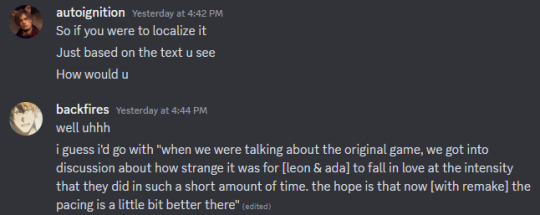

At the time that I asked for this translation and we were talking about it, I didn't say anything about what I know personally about the remakes' development.
But in addition to this translation, here's some context that a lot of people in this fandom seem to be missing.
This was said in an interview specifically about RE2make just after the game went gold. And at that time, there were no plans to develop RE4make in-house. RE4make was originally going to get outsourced to M-Two. Capcom only pulled it back in after RE3make drew heavy criticism, because M-Two were the devs on RE3make.
To be specific, the quote from the RE2make devs happened in 2019. RE4make got pulled back in-house in 2021.
So at the time this interview was given, there's no possible way that the devs could have been talking about an eventual RE6make, because they did not expect to be the ones working on an RE6make, if one was even ever going to be made at all -- because they didn't even expect to end up working on RE4make.
Which is interesting when you see that the quote in question "seems like a post-mortem."
In fact, the RE2make devs very coyly omitted any confirmation or denial of Leon and Ada's romance still existing at all in the remake-verse.

This is why it's so important to look at the original Japanese before actually throwing around "the devs said." That's how games of telephone happen, misinformation gets spread, and really nasty fights break out.
This is something that RE fandom is guilty of a lot, as seen in the other huge misunderstanding with regards to Leon and Ashley's relationship in RE4make.
So be careful out there.
Just something to keep in mind.
18 notes
·
View notes
Note
The idea of (Canon) Hunter meeting and even befriending Vee only to basically abandon her has been sitting in my head for over a year now, would love to read anything like it!
kind of obsessed with the concept of hunter being his still-very-empire-loyalist self who would never even Consider freeing the basilisks, but who nonetheless went out of his way to be nice to them because 1) they are SO interesting and are so much more responsive to questions if you are nice to them and 2) they can't help being evil soulsucking creatures of destruction who need to be permanently imprisoned for everyone's safety :( bad luck of the draw guys :(
hunter feeling incredibly betrayed after the Great Basilisk Escape because he TOLD THEM why things are how they are. he EXPLAINED!! he was NICE!! he BROUGHT THEM FOOD!! ADMITTEDLY NOT MAGIC FOOD THAT WOULD ACTUALLY SATE THEM BUT STILL!! he sometimes brought A BLANKET or TWO BLANKETS because concrete mold cells are DRAFTY. they knew all the reasons that they needed to stay in their miserable little isolated prison cells forever and they should have been okay with it for the greater good and they SPURNED HIM!!!
he's taking this Really personally.
for reasons that nobody could possibly quantify or understand.
🤨🤨🤨
#replies#toh#hunter toh#vee noceda#one of the things i wish for most re a longer show woulda been the hunter vee relationship development#as is we just have to pretend it was there. but because of that we can make up all the weird history we want!!#i think about pre character development hunter constantly.#striking an ASiAS style 'friendship' with the basilisks because theyre cool and he's nice. this is how friends work!!#yeah that. feels. like it could happen. or like it did happen.
21 notes
·
View notes
Text
The Shocking Redemption Arc of Chester Arthur
To my great pleasure, I get to tell you about Chester A. Arthur. If you don’t know his story, that’s a surprising statement, because most people don’t even recognize his name as one of the presidents. That’s a crying shame, because this guy has the most fascinating character arc of any president I’ve come across so far. He entered the presidency as a despicable, corrupt, conniving political lackey, and left it as--
Well, I’d best get on with the story.
Chester Arthur started out as an idealist. He was the son of an abolitionist Baptist minister, and though he dropped the religion in adulthood, he remained devoted to abolishing slavery. He became a lawyer with a New York firm that argued several civil rights case, and he rose to fame in 1854 when he served as the defense attorney for Elizabeth Jennings, the Northern version of Rosa Parks. Arthur’s victory in her case led to the desegregation of New York City’s public transportation.
During the Civil War, Arthur got an appointment as New York’s quartermaster general. After the war, Arthur returned to civilian life and became a Republican “party man” who worked behind the scenes to draw in voters, funding, and supporters. He and his wife Ellen (called Nell) both loved the finer things in life, which drove Arthur to do whatever he could to gain fame, wealth, and social status.
This is where I need to explain the spoils system. For the first hundred-plus years of American politics, all federal positions were filled by appointment. When a new president came into office, he could award government positions to his supporters--"to the victor go the spoils". Federal employees were required to donate money to the ruling party. There were no requirements for education or relevant experience. Any job could be filled by anyone with the right connections. If you think that sounds like a breeding ground for corruption and cronyism, you’d be absolutely right. By the 1870s, the system was getting extremely corrupt, and there was a growing push for reform.
But not by Chester Arthur. He owed his career to the spoils system. Through his work in the party, he became the right-hand man of Roscoe Conkling, New York’s senior senator and the state’s “political boss”. Conkling was a flamboyant showman, a magnetic politician, and a ruthless man. He had been a major supporter of Ulysses S. Grant’s presidential campaign, so Grant gave Conkling control over all the federal appointments in New York. Conkling used his power to fill positions with his friends and supporters, and he was brutal in attacking anyone who got in his way.
Because Chester Arthur was Conkling’s most loyal supporter, he got the best federal job in the country—Controller of the Port of New York. Before income tax, around 60-70% of federal funds came from the tariffs at this one port. The controller got a salary similar to the president’s, plus he was able to take a percentage of all the fines they levied. At the height of his power, Chester Arthur made $50,000 a year, which is a lot when the average skilled worker at the time made $500. (A rough estimate puts his salary at $1.3 million in today’s dollars.)
Arthur was living the high life. He racked up huge tailor bills. He had a gorgeously furnished house. His job allowed him to force his employees to donate a percentage of their salary to the Republican Party, which gave him even more power within the political machine. He bought huge amounts of wine and cigars that he handed out to people he was wining and dining for the good of the party. His wife resented that he was rarely home because of his political work, but Arthur loved the machine too much to stop.
After his 1876 election, President Rutherford B. Hayes desperately tried to reform the spoils system, but was blocked every step of the way by Roscoe Conkling. Finally, in 1878, Hayes managed to remove Arthur from his position as port controller, under suspicion of corruption, which allowed Arthur to spend more time working for New York’s political machine.
In January of 1880, Arthur was in Albany working for a political campaign when his wife caught pneumonia. By the time Arthur got home, Nell had fallen into a coma, and he wasn’t able to speak with her before she died. He felt guilty over her death, and especially the lack of closure caused by his devotion to politics. But instead of changing his ways, Arthur moved in with Conkling and became more devoted to politics than ever.
Which brings us to the 1880 Republican Convention. The Republican Party was split between two warring factions—the Stalwarts like Conkling who wanted to keep things the way they were, and the Half-Breeds who wanted civil service reform. President Hayes refused to seek re-election (partly because Conkling had made his life miserable) so these two factions somehow had to agree on a new candidate. Conkling supported a third term for Ulysses S. Grant. The Half-Breeds supported James G. Blaine of Maine—who happened to be Conkling’s mortal enemy.
James Garfield was there to nominate John Sherman—the Secretary of the Treasury and the younger brother of the famous Civil War general—and I can’t go any further in this story before I tell you a little bit about him. James Garfield is one of the most ridiculous overachievers in the realm of American politics. He was born into a dirt-poor farming family (he’s the last president ever to have been born in a log cabin). At sixteen, he left home to work on a canal boat, but quit after he nearly drowned, and his mother and brother scraped up enough money for him to go to school. His first year, he paid for his tuition by working as a school janitor. His second year, the school hired him to teach six classes (while he was still a student!) and then added two more because of how popular he was. By the time he was twenty-six, he was president of that same school. He became a lawyer and was elected to Ohio’s state legislature. During the Civil War, he became the youngest person to earn the rank of general. While fighting in the Civil War, his friends put his name in as a candidate for the US House of Representatives, and Garfield won even though he refused to campaign. He then served several terms in the House, where he became popular, but he refused to seek the presidency, because he’d watched several friends become warped by their presidential ambitions.
At the 1880 Republican Convention, Garfield was the more popular Ohio candidate, but insisted he was there only to nominate Sherman. At one point in his nominating speech, Garfield asked the audience, “Now, gentleman, what do we want?” To Garfield’s horror, one man shouted, “We want Garfield!”
Garfield remained loyal in nominating Sherman, but the spark had been lit. The voting went round after round after round for two days, with the votes being split between Grant, Blaine, and Sherman, with no one getting enough to win the nomination. Garfield got one vote in the third round. In the thirty-fourth round, Garfield suddenly got seventeen votes. Garfield stood to protest, saying no one had a right to vote for him since he hadn't consented, but the president of the convention--who was secretly thrilled because he liked Garfield more than any of the other candidates--told Garfield to sit down.
By the thirty-sixth vote, Garfield had won the nomination.
Now they had to choose a vice president. Several of the delegates got the idea to throw a bone to Roscoe Conkling. He was furious that Grant had lost the nomination, and he was vindictive. Conkling controlled New York’s political machine, so without him, the Republicans would lose New York, and without New York, they’d lose the election. He had to be placated. So the delegates nominated Chester Arthur, his right-hand man, as vice president.
Conkling told Arthur to refuse the nomination, but Arthur accepted, saying it was a greater honor than he had ever hoped to achieve. That's putting it mildly. The only position he’d ever held was port controller, and he’d been removed from that. Plenty of people thought nominating him was a horrible idea—a man like Chester Arthur only one step away from the presidency? But other people thought it was a shrewd political move—it would placate Conkling’s faction of the party, and Garfield was young and healthy and would rule in a time of peace. It wasn’t like there was any chance he’d die in office.
After Garfield was elected, Arthur immediately started causing problems. He all but openly boasted of buying votes in the election—which was not a great look when it had been a close race. He was completely on Conkling’s side in his war against Garfield. After Garfield appointed Levi Morton, a Stalwart, as Secretary of the Navy, Conkling sent Arthur and another lackey to drag Morton out of his sickbed--forcing him to drink a bracing mixture of quinine and brandy--and bring him to Conkling’s house to get chewed out, which caused Morton to resign. Conkling forced another Stalwart Cabinet nominee to resign on inauguration day.
Then Conkling went to war over the federal appointments. At first, Garfield placated him, appointing several of Conkling’s candidates. But then Garfield nominated Judge Robertson as Port Controller of New York Harbor. Conkling was livid. That was the prime federal position, a major source of Conkling’s power in the party, and Robertson was one of Conkling’s political enemies. In Conkling’s mind, Garfield had stabbed him in the back. Arthur agreed, and openly bad-mouthed the president to the press.
Conkling and the other New York senator resigned their Senate seats in protest—a dramatic political move. In those days, state legislatures voted for senators, and Conkling believed that since he controlled so many New York politicians, they’d easily get re-elected to their old seats. Unfortunately, the legislature was sick of being under Conkling’s thumb. The election became a drawn-out battle, and Chester Arthur went to Albany to help Conkling in his campaign.
While he was there, the unthinkable happened. On July 2, 1881, James Garfield was shot at a train station by Charles Guiteau, an insane office-seeker. Guiteau had come to the White House every day for months seeking an appointment under the spoils system. When that failed, he decided God wanted him to get Garfield out of the way so the spoils system could continue. After he shot the president, Giteau shouted, “I am a Stalwart, and Arthur will be president!”
As you can imagine, that made things really bad for Arthur. He’d just spent months fighting the president tooth and nail, and the assassin had mentioned his name. Plenty of people thought Arthur had something to do with the shooting. He and Conkling both needed police details to protect them from lynch mobs.
Arthur didn’t want to be president; in his mind, vice president was the perfect job—a position with a lot of political leverage, but no responsibility. He went to the White House hoping to convince Garfield that he had nothing to do with the shooting, but the doctors wouldn’t let him in the room. He managed to speak to the First Lady, where he got choked up with emotion and was observed to be in tears. A reporter later found him in the house where he was staying in Washington, and noted he'd obviously been weeping.
To Arthur’s relief, Garfield seemed to get better. The bullet had missed his spinal cord and all his major organs. If he’d been left alone, Garfield would have made a complete recovery. Unfortunately, his doctors repeatedly prodded the bullet wound with unsterilized instruments, and Garfield fell victim to a massive infection. He lingered for months, slowly starving and rotting to death.
Through all this, Arthur stayed in New York and refused to take up presidential duties; with so many people accusing him of the assassination, he didn’t want to make it look like he was preparing to usurp the throne.
It eventually became clear that the assassin had acted alone, which laid the rumors to rest, but no one wanted Arthur to be president. James Garfield had been a man of the people. The working class considered him one of their own, proof that anyone could rise from poverty and become president. He was an idealist, a champion of civil rights, a family man who lived modestly. For the first time since the Civil War, a president had been supported by both the north and the south, and the country had come together in grief. Chester Arthur was Garfield’s exact opposite—a conniving political lackey who’d become a millionaire through corruption.
James Garfield died on September 19th. To the American people, it looked like their worst nightmare had come true. Conkling’s lackey was in the White House, and now Conkling would rule the nation the same way he’d ruled New York.
Yet, to everyone’s surprise, President Chester Arthur became a completely different man. In one of his first speeches, he listed civil service reform as one of his top priorities—a shocking move for a man who’d become president through the spoils system. Soon after Arthur’s inauguration, Conkling demanded he name a new Controller of the Port of New York. Arthur angrily refused and called Conkling’s demand outrageous. Conkling stormed out in fury and never forgave Arthur. (Arthur did later risk his reputation to nominate Conkling for the Supreme Court, but Conkling, ever petty, refused the position.)
Arthur didn’t have a complete personality transplant. He still lived lavishly, hosting lots of state dinners. He still preferred the social duties of the presidency to actual government work, and he was a hopeless procrastinator. Always fastidious, Arthur refused to move in to the rotting, rat-infested White House until they fixed up the dump, and he ran up extravagant bills during the remodel.
Yet, as a president, he was...respectable. He worked for African-American civil rights. He started a major process of rebuilding and reforming the outdated and corrupt navy. He did sign the Chinese Exclusion Act, but he had vetoed an earlier, harsher version and only signed a much-reduced one (that probably would have been voted in anyway if he’d vetoed it). That remodel of the White House, even if it ran over-budget, was long overdue.
Most shocking of all was his unswerving devotion to civil service reform. He continued an investigation into a government postal scandal, even though everyone assumed he’d drop it. He voiced his continuing support for reform efforts. In 1883, Arthur signed the Pendleton Civil Service Reform Act. As written, the act required only 10% of federal jobs to be assigned based on merit, and even that required the president to take action to enforce it. People assumed that Arthur would sit back and do nothing, so the spoils system would remain in place. Yet Arthur immediately formed a commission to enact the reform, even appointing some of his old enemies. The man who’d benefited most from the spoils system became the one to finally destroy it.
How do we explain such a complete and sudden change? Part of it’s a matter of personality. If I can indulge in a bit of meta, Chester Arthur seems to be a textbook example of the sanguine-phlegmatic temperament—someone who wants to fit in with the crowd, to go with the flow. As a political lackey, this made him self-serving and amoral, but as president, the crowd he had to impress was the American people. After months of getting crucified in the press, with tons of articles saying what they didn’t want him to be, he’d have plenty of motivation to become what they did want him to be.
A more important motivation, though, was death. His wife’s death was likely the first shock that would make him step back and take stock of his political career. Garfield’s death had an even more profound influence on him. The spoils system had led a madman to murder a president in Arthur’s name; if anything could motivate a man to change the system, that would be it. Even more profound than that was his own death. Not long after entering the White House, Arthur was diagnosed with a fatal kidney disease. He hid the diagnosis during his term, but his actions in office were the actions of a man doomed to die, with a mind toward the legacy he’d leave behind.
Yet there’s another stranger, more mysterious influence that I’ve left to last because of how cool the story is. The day before his death, Chester Arthur—who’d become ashamed of his old life—asked a friend to burn the vast majority of his papers. Years later, among the papers that had been spared, his grandson uncovered a packet of twenty-three letters from a 31-year-old invalid named Julia Sand. Julia came from a family very interested in politics, and her illness meant that she spent a lot of time reading the newspapers, so she was familiar with Chester Arthur’s political career. In August of 1881, she sent Chester Arthur a letter that began, “The hours of Garfield's life are numbered—before this meets your eye, you may be President. The people are bowed in grief; but—do you realize it?--not so much because he is dying, as because you are his successor.” Over seven pages, Julia scolded Arthur for his corrupt ways, but assured him of her faith in his better nature, and urged him to reform. She sent letters over the next two years, full of encouragement and scolding and political advice. She called herself his “little dwarf”, because her lack of ties to him meant she could be completely honest with him.
There’s no evidence he ever answered her. But she did offer some rather specific political advice that he seems to have followed. And he did visit her once. In 1882, he stopped by her house in the presidential carriage, surprising her and her family (who had no idea she’d been writing to the president) with an hour-long visit. She seemed to grow more frustrated with his lack of answers after that, and no letter exists after 1883.
There’s no way to say what kind of effect the letters had on him. But amid all the turmoil after the assassination, it must have meant something to have one voice saying she believed in him. She was a voice from outside the Washington political machine, who could serve as a sort of conscience. The fact that those letters survived when so much else burned suggests he considered them worth saving.
No matter the reason, the truth remains that Arthur entered the presidency as an example of all that was dirty and loathsome in the political system, and he left it as a respectable man. In giving up his old ways, he sacrificed connections he’d spent years building. His old friends never forgave him, and his old opponents never quite trusted his reform, yet he did what he thought was right even if it meant he stood alone. In summing up his presidency, I don’t think I can do better than contemporary journalist Alexander McClure: “No man ever entered the Presidency so profoundly and widely distrusted as Chester Alan Arthur, and no one ever retired... more generally respected, alike by political friend and foe.” I think that deserves to be remembered.
#history is awesome#presidential talk#i apologize but i really can't see any way to cut this down#i like the detour into garfield's nomination#i can't cut conkling out any more than i have#i can't leave out his wife#i didn't even mention that he was washington's most eligible bachelor during his term but he remained faithful to her memory#or that his sister served as hostess at the white house and helped raise his daughter (who he protected from the press as best he could)#or that he did make a half-hearted attempt to seek re-election so people wouldn't think he was slinking off in disgrace#and there was some support for him#but he didn't mind at all when someone else was nominated because he was dealing with his kidney disease#and he died in 1886#which means he had the shortest post-presidency life of anyone except james k. polk who died three months after leaving office#i did not come into last week thinking that by the end of it i'd have developed a minor specialization#in the presidency of a guy i knew only for his facial hair and his half-verse in the animaniacs song#i didn't even mention the facial hair!#go to wikipedia and see his glorious muttonchops!#say what you will about the victorians but they had wild facial hair game#but anyway here is the life story of my impeccably dressed trash panda son#who is put together on the outside and a mess on the inside#and still manages to maintain a certain dignity despite how pathetic he is#he's a mess of a human being but i love him your honor
31 notes
·
View notes
Text
I literally can't believe you do not get a one-on-one section or conversation with estinien until the VERY END OF THE GODDAMN EXPAC
#saint.txt#spoilers#major spoilers#estinienposting#YOU KNOW? THE NEWEST GUY HERE WE KNOW THE LEAST?#WHO'S CHARACTER DEVELOPMENT HAPPENED OFFSCREEN?#DEVELOPMENT THAT HAS COMPLETELY CHANGED HIM AS A PERSON SO WE CAN'T COAST OFF HIS HW CHARACTERIZATION?#WHO NEEDED THE MOST HELP BC OF HIS INHERITED WRITING PROBLEMS FROM HW?#(yes I know they wrote a short story abt him. my rule is that I am fairly harsh on important character details and lore that is not#communicated in the primary medium. ie. if I have to go somewhere else to learn core character lore it should be in-game.)#but no. he's just here to be vr.tra's hype man. and I like vr.tra but goddamn.#like no wonder he feels like a side character just tacked onto the scions bc he's consistently treated as one by both them and the narrativ#and nothing is ever really done with that bc it COULD be a genuine conversation on the insularity of the scions and their work#and his perspective as an outsider with a completely different background and history and experiences could be a genuinely interesting#addition to the group dynamic as a shakeup but no!!! he's just here to be funny bc man stupid and nothing else happens!!!#he could comment on how genuinely uncomfortable his joining was (where he was basically press-ganged into it) and how he's been treated#re: the failure to keep him in the loop and the rough way he slots into the group dynamic and the pure fact that he is an outsider#to a years-long established group of friends and unintentionally or otherwise treated as an intruder / obviously doesn't feel comfortable#hanging out with his colleagues bc he passes up every opportunity to do so and how his position here is still 'mercenary'#and not 'friend and ally' AND how he's one of the few ppl here who can genuinely connect w/ the wol re: the lightwarden thing#sorry I'm ranting again but this man's writing is all over the goddamn place and I really do not get the sense that his promotion#to main character status was like. planned out in advance. bc nothing is really done with it other than hey vr.tra here's your dude.
4 notes
·
View notes
Text
how the fuck has IC had an official disability code in the US since 2007 but i've never been able to get help or accommodations for it on the basis that it doesn't count as a disability. i have a life long bladder condition that is medically known to have a quality of life "on that with end stage kidney failure" and i've been diagnosed since i was fourteen fucking years old and all anyone's ever told me is "sorry that doesn't count"
#i'm having trouble sleeping again and went down the chronic illness rabbit hole and i am fucking FUMING right now#do you know how many times i tried to get disability and kept getting denied because i got told IC wasn't a disability?#i fucking hate it here. 'there is no known cause' BECAUSE NO ONE CAN GET FUCKING MONEY TO RESEARCH IT#honestly depending on what's going on with my other issues i'm.....................#concerned i might have to try and contact chris for family history on his side bc i'm positive the uro issues are from his family#ntm he literally has one kidney that never fully developed lmaooooo#i wonder if i could start getting some genetic testing done re this and the gut demons#ugh i gotta sleep but i just :( can't
2 notes
·
View notes
Text
Weapons of Mass Construction
#THE WEAPONS OF MASS CONSTRUCTION#I C B M#I = INTELLECT {g_yan}#Yes#letter “I” infers to Intellect or Gyan or Wisdom. Intellect is the foundation of a constructive mind. Intellect or Intelligence differenti#000 years ago with a clear understanding of progress in life from “balashram – yuwaashram – grihasthashram – vanprasthashram”. Our history#the temporary is so permanently sedimented that we waste 3/4th of life behind fragile belongings and are left with little or no energy by t#I am not sure what science will achieve by linking electronic chips with human brains. Though people are claiming to find solutions for dis#Schizophrenia – BUT can an electronic chip really ‘re-wire’ the brain which has not been understood by science OR else we could have re-cre#Educate your children to study the old scriptures about the purpose and philosophy of life. Teach ourselves to learn to live a patient#peaceful life. Money is only a commodity to survive#WE should not become a commodity for Money! Think Simple#Eat Healthy (NO MEAT)#Keep yourself clean – physically and mentally#Make people around you smile#Learn to Live and for Lives of Other Humans#Sleep like a baby#Love like a child loves mother#Use intellect for inner self & not Destruction.#Cultivate intellect in your personality. It is very easy to be wise – you only have to develop habit of listening#patience and a calm attitude. As per scriptures wisdom can be attained from saints or sadhus. I am of the opinion that wisdom is to act rig#it is the external knowledge that corrupts human wisdom and tweaks it.#Gurukuls in ancient times used to impart knowledge to sharpen our wisdom#to brighten the wise thoughts. Humans grew understanding that all around us is nashwan meaning WE are nashwan#hence having a false “ownership” of things around us or should I say a false “MY THING” is un-rudimentary. What is around us will remain in#Think#Think – is it really wise to run behind ‘ownership or acquisition’ of things – Things that you and me slog to ‘own’ will eventually remain#C = COMMUNICATION {U_wach}#Communication is to hear what is being heard and what is not being heard. Lord Krishna communicated “Bhagwat” only to Arjun in presence of#factories
1 note
·
View note
Text
Given the fact that I have spent over 10 hours attempting to complete Fell Xenologue 6 to no avail, I’ve finally decided to look up a guide for it. god.
#this map is hell. literal hell.#good job developers for making the hardest map in recent fi/re emblem history.#but why#the difficulty curve from the base game to the DLC is a 📈#kris speaks
0 notes
Text

LaRue Burbank, mathematician and computer, is just one of the many women who were instrumental to NASA missions.
4 Little Known Women Who Made Huge Contributions to NASA
Women have always played a significant role at NASA and its predecessor NACA, although for much of the agency’s history, they received neither the praise nor recognition that their contributions deserved. To celebrate Women’s History Month – and properly highlight some of the little-known women-led accomplishments of NASA’s early history – our archivists gathered the stories of four women whose work was critical to NASA’s success and paved the way for future generations.
LaRue Burbank: One of the Women Who Helped Land a Man on the Moon
LaRue Burbank was a trailblazing mathematician at NASA. Hired in 1954 at Langley Memorial Aeronautical Laboratory (now NASA’s Langley Research Center), she, like many other young women at NACA, the predecessor to NASA, had a bachelor's degree in mathematics. But unlike most, she also had a physics degree. For the next four years, she worked as a "human computer," conducting complex data analyses for engineers using calculators, slide rules, and other instruments. After NASA's founding, she continued this vital work for Project Mercury.
In 1962, she transferred to the newly established Manned Spacecraft Center (now NASA’s Johnson Space Center) in Houston, becoming one of the few female professionals and managers there. Her expertise in electronics engineering led her to develop critical display systems used by flight controllers in Mission Control to monitor spacecraft during missions. Her work on the Apollo missions was vital to achieving President Kennedy's goal of landing a man on the Moon.
Eilene Galloway: How NASA became… NASA

Eilene Galloway wasn't a NASA employee, but she played a huge role in its very creation. In 1957, after the Soviet Union launched Sputnik, Senator Richard Russell Jr. called on Galloway, an expert on the Atomic Energy Act, to write a report on the U.S. response to the space race. Initially, legislators aimed to essentially re-write the Atomic Energy Act to handle the U.S. space goals. However, Galloway argued that the existing military framework wouldn't suffice – a new agency was needed to oversee both military and civilian aspects of space exploration. This included not just defense, but also meteorology, communications, and international cooperation.
Her work on the National Aeronautics and Space Act ensured NASA had the power to accomplish all these goals, without limitations from the Department of Defense or restrictions on international agreements. Galloway is even to thank for the name "National Aeronautics and Space Administration", as initially NASA was to be called “National Aeronautics and Space Agency” which was deemed to not carry enough weight and status for the wide-ranging role that NASA was to fill.
Barbara Scott: The “Star Trek Nerd” Who Led Our Understanding of the Stars

A self-described "Star Trek nerd," Barbara Scott's passion for space wasn't steered toward engineering by her guidance counselor. But that didn't stop her! Fueled by her love of math and computer science, she landed at Goddard Spaceflight Center in 1977. One of the first women working on flight software, Barbara's coding skills became instrumental on missions like the International Ultraviolet Explorer (IUE) and the Thermal Canister Experiment on the Space Shuttle's STS-3. For the final decade of her impressive career, Scott managed the flight software for the iconic Hubble Space Telescope, a testament to her dedication to space exploration.
Dr. Claire Parkinson: An Early Pioneer in Climate Science Whose Work is Still Saving Lives

Dr. Claire Parkinson's love of math blossomed into a passion for climate science. Inspired by the Moon landing, and the fight for civil rights, she pursued a graduate degree in climatology. In 1978, her talents landed her at Goddard, where she continued her research on sea ice modeling. But Parkinson's impact goes beyond theory. She began analyzing satellite data, leading to a groundbreaking discovery: a decline in Arctic sea ice coverage between 1973 and 1987. This critical finding caught the attention of Senator Al Gore, highlighting the urgency of climate change.
Parkinson's leadership extended beyond research. As Project Scientist for the Aqua satellite, she championed making its data freely available. This real-time information has benefitted countless projects, from wildfire management to weather forecasting, even aiding in monitoring the COVID-19 pandemic. Parkinson's dedication to understanding sea ice patterns and the impact of climate change continues to be a valuable resource for our planet.
Make sure to follow us on Tumblr for your regular dose of space!
#NASA#space#tech#technology#womens history month#women in STEM#math#climate science#computer science
2K notes
·
View notes
Text
"The RE4make devs intended for Leon and Ashley's interactions to be seen as strictly platonic" is the biggest lie that gets passed around in RE fandom
So, what's the truth?
There was an article written for Game Informer during the pre-release of RE4make where the devs talked about revamping Ashley's character from what she was like in OG, because they recognized that if the player hated Ashley (like many OG players did), they'd probably hate the game.
One of the things they improved re: Ashley was her relationship with Leon.
RE4make had two directors: Yasuhiro Ampo and Kazunori Kadoi
Kadoi wanted Leon to hold Ashley's hand during gameplay, but Ampo didn't like it and shot down the idea.
This is the exact quote:

The translation from the original Japanese quote to what was written in the English article seems... unpolished. The text of the article says that this was just an idea pitched during concept drafting, but Kadoi's quote sounds more like the handholding was something that was actually implemented in the game but then taken out when Ampo didn't like it. Without seeing the original Japanese of what Kadoi actually said, it's impossible to know what actually happened there.
We also don't know what Kadoi meant by saying "Ampo thought it looked like [Leon and Ashley] were too close." Fandom has taken it to mean that Ampo thought that Leon and Ashley looked too close in their relationship, but with how shaky the translation here seems to be, he could have just as easily meant that they looked too close physically and took up too much space on the screen in a way that negatively impacted gameplay.
But regardless of when and how it happened, the fandom took this quote from Kadoi and played a game of telephone with it. A lot of context and nuance is missing from Kadoi's quote to begin with, which made it really easy to twist his words. Personally, I don't see how Leon leading Ashley around by the hand like she was a child would be something that a grown man like Ampo would see as romantic -- it just comes off as patronizing and infantilizing to me -- but, again, there are pieces of this story that are clearly missing on top of the poor translation.
But even if Ampo did shoot down the handholding because he thought that they looked too romantically entangled or whatever, the fact of the matter remains that it was only just his personal, solitary opinion and objection. And from the way Kadoi tells the story, it sounds like he (Kadoi) is still a little bit miffed about it -- it sounds like it was something he really wanted to have in the game.
It also bears keeping in mind that Kadoi said this as a fun, throwaway little anecdote that was meant more as a jab at Ampo than anything else -- not a serious statement about intention that he wanted players to make note of.
So the biggest detail that's missing here is: the context for how and why this decision was made. If this was something that Kadoi wanted in the game so badly -- to the point of openly roasting Ampo about it in interviews with Western games media -- then why did he relent and let Ampo's word supersede his? For all we know, this was part of a compromise of "I let you have your fairy tale, but this show of affection is too far."
But we don't know. And we can't know. Because we weren't in the room when it happened, and Kadoi didn't give us enough information for us to know.
What gets lost here is that Yasuhiro Ampo wasn't the only person who worked on the game -- and, in fact, wasn't even the only director for the game -- and his view on this clearly does not seem to speak for the entire dev team.
So what started with Kadoi saying "Ampo specifically didn't like the idea of Leon and Ashley holding hands during gameplay" morphed into "The devs didn't like the idea of Leon and Ashley holding hands [at all]" which then got twisted further into "The devs wanted to make sure that Leon and Ashley's interactions were seen strictly as platonic."
But that's not what was ever said.
And to be completely honest with you, this is such a tangential nothingburger of a quote that I'm sure that Kazunori Kadoi's forgotten that he ever even said it. Fandom gives way too much weight to this inconsequential, unserious little side story of nothing.
8 notes
·
View notes
Text

When I think back on the Speak Now album, I get a lump in my throat. I have a feeling it will always be that way, because this period of time was so vibrantly aglow with the last light of the setting sun of my childhood. I made this album, completely self-written, between the ages of 18 and 20. I've spoken about how I feel like those ages are the most emotionally turbulent ones in a persons life. Maybe when I say that, I'm really just talking about myself.
I think they might just be the most idealistic, hopeful years too. At this point in my life, I had released my second album, Fearless. It became the breakthrough moment I'd always dreamt of, one that catapulted my career to new realms of success. It had brought with it a tidal wave of pressures and pitfalls and growing pains. All the while, I was encountering the milestones and checkpoints of normal teenage growth. I had cataclysmic crushes and brushes with heartache. I moved out of my parents' house and set my bags down in a new apartment. I hung photos on my own walls and decorated the space where I would sob and cackle and shatter and dream. Sometimes I felt like a grown up, but a lot of the time I just wanted to time travel back to my childhood bed, where my mom would read stories to me until I fell asleep.
In my darker moments, I was tormented by the doubt that swirled loudly around my ascent and my merits as an artist. I was trying to create a follow up to the most awarded country album in history, while staring directly into the face of intense criticism. I had been widely and publicly slammed for my singing voice and was first encountering the infuriating question that is unfortunately still lobbed at me to this day: does she really write her songs? Spoiler alert: I really, really do.
In the years since, I've developed a thicker skin about public criticism and the cynicism with which some people approach the music I make. At that time, it leveled me. I had these voices in my head telling me that I had the perfect chance and I blew it. I hadn’t been good enough. I had given it all I had and been found wanting.
I wanted to get better, to challenge myself, and to build on my skills as a writer, an artist, and a performer. I didn't want to just be handed respect and acceptance in my field. I wanted to earn it. To try and confront these demons, I underwent extensive vocal training and made a decision that would completely define this album: I decided I would write it entirely on my own. I figured, they couldn't give all the credit to my cowriters if there weren't any. But that posed a new challenge: It really had to be good. If it wasn't, I would be proving my critics right.
I had no idea how much this pain would shape me. That this was the beginning of my series of creative choices made by reacting to setbacks with defiance. That my stubbornness in the face of doubters and dissenters would become my coping mechanism through my entire career from that point forward. This exact pattern of enacting my own form of rebellion when I feel broken is exactly why you're reading these very words, and I'm re-releasing this album now.
I went through my first worldwide scandal (the mic grab seen around the world). I experienced the weirdness of trying to get to know a boy while a swarm of paparazzi surrounds the car. Media contacting my publicist for an official statement on why two teenagers broke up. These are weird experiences to have at any age, but even more surreal when you're 19.
I had the nagging sense that in the most intense moments of my life, I had frozen. I had said nothing publicly. I still don't know if it was out of instinct, not wanting to seem impolite, or just overwhelming fear. But I made sure to say it all in these songs. I decided to call the album Speak Now. It was a play on the speak now or forever hold your peace' moment in weddings, but for me it symbolized a chance to respond to the chatter and commentary around my own life.
Some of these emotional revelations were surprising to people. Some expected anger and instead got compassion and empathy with 'Innocent'. Some expected a kiss-off breakup song but instead got a hand-on-heart apology, 'Back to December. It was an album that was the most precious to me because of its vast extremes. It was unfiltered and potent. In my mind, the saddest song I've ever written is 'Last Kiss'. My most scathing is 'Dear John' and my most wistfully romantic is 'Enchanted'.
I'll be forever proud of setting a goal and seeing it through. I'lI always feel shivers all over when I remember singing 'Long Live' to close the show every night on tour. The outstretched hands of those bright and beautiful faces of the fans. Their support was like an open palm that reached out and helped me up off the ground when others were, frankly, mean.
These days I make my choices for those people, the ones who thought I had been good enough all along. I try to speak my mind when I feel strongly, in the moment I feel it. I'm still idealistic and earnest about the music I make, but I'm less crushed when people mock me for it. I know now that one of the bravest things a person can do is create something with unblinking sincerity, to put it all on the line. I still sometimes wish I was a little kid again in a tiny bed, before I ever grew up.
I always looked at this album as my album, and the lump in my throat expands to a quivering voice as I say this. Thanks to you, dear reader, it finally will be.
I consider this music to be, along with your faith in me, the best thing that's ever been mine.
Yours,
Taylor
#taylor swift#speak now (taylor’s version)#speak now tv#sntv prologue#speak now taylor’s version#sntv
4K notes
·
View notes
Text
Aziraphale and Crowley's relationship dynamic fascinates me and what fascinates me even more is how people perceive them, partly because I seem to have a much more optimistic view of their dynamic than a lot of what I read suggests they do.
With that in mind I started trying to unpick how I see their dynamic and why and what I ended up with was a series of rambles on various aspects, including confidence, trust, silliness and what they ask of each other. This one is about what they ask of each other and why their relationship isn't some weird one-sided thing where Crowley gives Aziraphale everything he could possibly want or ask for.
I see a lot of posts and things suggesting Crowley always rolls over and does anything Aziraphale asks of him. I don’t know to what extent most people really believe this or if it’s just a fun joke (and I’m not saying that’s bad, I think it’s a fun joke too, I love reading all that stuff and it makes me laugh). The point I wanted to make here though is that I don’t think it’s true and also why I don’t think it’s true.
Everything from here on out is my opinion, but I won’t keep stating that in order to make it more easily readable, just take it as a given. If your opinion is different that’s absolutely fine, I love that we can all see this stuff in different ways depending on our experiences and personalities, it’s why the fandom is so fun. (It’s also why my opinion on so many things in season two ricochets wildly from one theory to another).
So back to Crowley and Aziraphale – I don’t think Aziraphale walks all over Crowley, or certainly not to the extent that people sometimes think he does. Also Crowley doesn’t and wouldn’t allow himself to be walked all over anyway. Why is this even relevant? Because I’ve seen people say that in the final 15 minutes Aziraphale finally asked Crowley to do something that pushed him over the edge and that Aziraphale was shocked when Crowley didn’t roll over and do it because Crowley always does what Aziraphale asks. This isn’t at all true for a start, but also this view tends to include a second assumption, which is that their relationship is one-sided and Aziraphale never does anything for Crowley, that he dismisses him and takes him for granted, which also is not true in a lot of ways. I think it’s a fundamental misinterpretation of their relationship dynamic.
First of all why can Crowley’s actions be interpreted as just rolling over and doing whatever Aziraphale wants? Well, the answer to that is three-fold – firstly Crowley is a genuinely unselfish in many ways, he does things for people because that’s the way he is, it doesn’t make him a pushover, it just makes him nice. Secondly he loves Aziraphale deeply. Whether he knows it or not doesn’t matter, he cares for Aziraphale and wants him to be happy. This isn’t the same as being a complete doormat, it’s simply compromising with the person you are in a relationship with and occasionally prioritising them over yourself. Both these things come together in the third thing, which is that Crowley’s love language is acts of service – he enjoys doing nice things for Aziraphale, he enjoys rescuing him, or going along with him and letting him have his own way, so why not do it? The point is he’s never railroaded into it by Aziraphale, it’s always a deliberate choice. He is literally saying, I will do this thing for you because I love you and I enjoy making you happy and this is something I feel I can give to you.
How does Aziraphale see this behaviour?
Well that’s a tricky one, because in many ways Aziraphale is the more complex character, not least because he changes the most over the course of their history together. Is there a slight element of him taking Crowley for granted in some of their interactions, especially in season two? Possibly, but mostly I don’t think that’s it at all. When someone gives you things because their love language is acts of service you develop a (mostly sub-conscious) confidence in that relationship dynamic and if you also have confidence in yourself (which Aziraphale absolutely does – I’ll write more on this another time) then when you want something you ask for things. You ask not because you learn to expect, but because you think you’re worthy of asking and you think that your relationship is strong enough to stand up to the ask. I ask my husband for things all the time, sometimes they’re things I know he’ll give me – these are easy asks (I don’t just mean physical objects, I also mean acts of service such as helping me with something), sometimes though I’ll ask for things knowing he probably won’t give me that thing or without having a clue what his answer will be – these are harder asks, the sort you don’t do early on in relationships because they might break it either in one go or over time. Sometimes a hard ask results in me getting what I want, sometimes it results in a bit of back and forth before I get what I want, sometimes I get a no and I’m temporarily annoyed or upset, sometimes I get a no and I accept it because I knew it was the most likely outcome.
The point is that I ask, and so does Aziraphale. You ask because you have confidence that you are worthy of the ask and also that your relationship is strong enough to bear the request, even if the answer is no. Can a no still be annoying or upsetting? Yes absolutely. Can a no still be wrong on the part of the other person? Also yes. The point is that sometimes the no isn’t wrong and it doesn’t necessarily break the relationship. By the time season two comes along Aziraphale is confident enough in his relationship with Crowley to feel it can bear the weight of him asking.
So what happens when he asks? Does Crowley roll over?
Well no, he doesn’t. One big example of this is right at the beginning of the series, in episode one. Here Aziraphale makes a massive ask of Crowley and he knows it’s a big ask. Even before he tells Crowley what the problem is he’s aware of the possibility of a no. “Is it something I can help you with?” Crowley sayss, and Aziraphale merely shrugs. It’s not because Nina is there, she’s gone by that point. It’s also not because he doesn’t have faith in Crowley’s ability to help him, he always has faith in Crowley’s abilities (this is a whole other thing on trust). What he’s doubting is whether Crowley will help him. It’s why they’re meeting in the café, not the bookshop. He wants to break this one to Crowley a bit at a time – there’s a problem and I need help. I want your help, it’s why I called you, but you aren’t going to like it and I’m not even sure whether you will help so I’m establishing that I need help first, rather than showing you Gabriel immediately, so that you aren’t completely surprised when I present the whole problem to you.
Once they go to the bookshop and Crowley is confronted with Gabriel he offers the help he feels able to give by saying that he’ll drive Gabriel somewhere and dump him. He’s stating his willingness to help (which is important later), but for now he’ll only help in one specific way. What he isn’t willing to do is any more than that, not even for Aziraphale.
Help me take care of Gabriel. Help me sort this mess out, Aziraphale says, and what does Crowley say? No. Absolutely not. You’re on your own with this one. Even after Aziraphale practically begs him for help, complete with puppy dog eyes and the magic word, “I’d love you to help me,” Crowley still says no. That is not the reply of someone who lets themselves be walked all over or who rolls over every time the angel they’re in love with flutters their eyelashes.
Okay so what about the fact that he returns? Well, the stakes have been raised: for a start Aziraphale is now directly in danger, which alters the balance in favour of helping him, and remember he was already willing to help, he said as much, but he was previously only willing to help in one way. Now that’s changed. Doing things you wouldn’t normally do for someone you love when the stakes are raised is a perfectly normal rection in a relationship and does not indicate an unhealthy dynamic. Crowley has now realised that getting rid of Gabriel is no longer an option - his preferred plan (dumping Gabriel somewhere) will no longer work, so the only choice is now Aziraphale’s plan of keeping him in the bookshop and taking care of him.
This is why he returns.
A quick note on the call
Just backtracking a bit here – when Aziraphale calls Crowley to ask him for help Crowley agrees to be over in two minutes. It’s instant, no questions asked and at first glance looks like Aziraphale calls and Crowley comes running just because. But nope. Later we are very clearly told that Crowley knows something is wrong the moment he picks up the phone and Aziraphale starts speaking, “This was your ‘Something’s Wrong’ voice.” Crowley already knows there’s a problem and what do you do when your closest friend calls you and tells you about a problem? You try to help. Whether that’s advice, comfort, physically going around to help out or whatever the situation calls for. Of course Crowley says he’ll be there in two minutes, he doesn’t exactly have anything else on and his friend has just indirectly told him something is wrong. He’d be a pretty shitty person/entity if he didn’t agree to drop round and try to help.
So what about the 'I was wrong' dance?
This whole interaction, that many people say indicates how under the thumb he is actually shows us the exact opposite. What’s the first thing Crowley says when Aziraphale asks him to do the dance? “I don’t do the dance.” This tells us a hell of a lot about their relationship dynamic up to this point – for a start Aziraphale has clearly done the dance before, at Crowley’s request, and he lists off the occasions. The dance is silly and slightly demeaning and Aziraphale has done it several times for Crowley, whilst Crowley has never done it, yet somehow we read this whole scene as Crowley being the whipped one? Um. No. Also heavily implied in Crowley’s, “I don’t do the dance” statement is, You’ve asked me to do this before, I’ve always said no because I don’t want to. You’ve always accepted my no before and I want (expect!) you to accept it this time.
But this time Aziraphale doesn’t accept the no. Just like Crowley wouldn’t go along with his plan earlier, Aziraphale now won’t go along with Crowley’s no. Clearly he has done so in the past, but this time their dynamics are different. They’ve been much more open about their friendship for the past four years, they’ve both accepted that they are at least close friends, if not more. They’ve saved the world together and saved each other. They both acknowledge they “carved (this existence) out for ourselves” and that brings strength to their relationship. Now that Aziraphale has more confidence in what they are to each other, he takes that confidence and tests the limits of what Crowley will do for him, to push them more towards equality. Why should he always be the one to do the dance? Crowley responds by acquiescing not because he would just roll over and do anything for Aziraphale but because he recognises three things. Firstly that Aziraphale is pushing and that this is new and that this means something to him in the context of their relationship, secondly because he reluctantly accepts Aziraphale’s point that it isn’t really fair that he never does it, and finally because the request for him to do the dance isn’t about him refusing to help (Aziraphale was never certain he would), it’s about the fact that he’s broken Aziraphale’s trust by refusing to help (which is a slightly and very subtly different thing). To illustrate this, right before Crowley does the dance, just after he says “fine,” he gets this very brief, soft look on his face – this is him acknowledging to himself that Aziraphale deserves this dance, that he loves the angel and that he’s doing this because of both those things – he could have continued to insist on a no, he clearly has before, but this time he chooses not to.
I will do this thing for you because I love you and I enjoy making you happy and this is something I feel I can give to you.
All right, what about the car thing?
What about it? Lending your car to the person you love is very normal. Ok so the car means more to Crowley than a normal car does to us, but the point still stands. Aziraphale is making a reasonable request here. Does he expect a yes? Absolutely, because he also knows it’s a reasonable request given where their relationship is. Does he flirt to get his own way? Hell, yes. Does Crowley know exactly what Aziraphale is playing at? Also a hell yes. And Crowley totally plays up to it, he’s not as opposed to it as he claims. He’s playing up his “no” and his grumpiness for effect, to encourage Aziraphale’s silly flirtiness. Look at the difference between this no and the no he gave Aziraphale earlier. There’s no anger here, there’s no real sense that he thinks Aziraphale is asking too much, he’s playing a role in their relationship and they’ve both played this game before. Look at that little slap of the hand, which Aziraphale responds to equally playfully. The game even continues after Muriel turns up at the shop, when it’s already quite clear that Crowley is going to let Aziraphale use the car (he’s already taking the plants out). Even in the back-room Crowley still teasingly grumbles about trains whilst Aziraphale smiles flirtily, and Crowley playfully withholds the car keys when Muriel interrupts them. They both know Aziraphale is going to end up with them, there’s no point to him not directly handing them over in spite of the interruption, it’s just an excuse to tease Aziraphale back. I mean, look at him – he spends the rest of the conversation wiggling his hips, grinning smugly and confidently handling the Muriel problem by talking about love. Aziraphale’s very overt reaction tells you all you need to know about the dynamic of this one.
Two can play at this flirting game, angel.
But he follows him around like a little puppy!
Well, yes and no. Sure he follows him around whilst he goes around asking all the shopkeepers to the meeting, but he does that because it’s fun for him. He’s curious, Aziraphale is acting oddly, doing something he’s never done before and Crowley wants to know what it is. He’s always found him fascinating – what silly and ridiculous thing is the angel up to now?
Also wanting to hang out with the person you are in love with isn’t at all strange or a sign you are in some sort of weird relationship where only one of you calls the shots. It’s normal. Crowley knows Aziraphale has a tendency to be silly or do unexpected things and he wants to watch him do them and also flirt with him whilst he’s doing them. Looking grumpy and reacting to Aziraphale’s silliness with disbelief is how Crowley flirts-without-flirting. Both of them know, understand and like that dynamic, and he has that role not because he’s unhealthy levels enthralled with everything Aziraphale does but because of the levels of trust they have spent millennia establishing.
What Crowley doesn’t do is wait around for Aziraphale. Look at the scene where Aziraphale daydreams about Job. In that scene he’s aware Aziraphale has something else to show him (the record clue), but he doesn’t stick around whilst Aziraphale ignores him. He could have sat down somewhere in the shop and waited – he’s got an eternity, waiting an hour or so is no big deal, but waiting around like that would suggest he really is a doormat, just waiting for the next time Aziraphale shows him any attention. He doesn’t do that, instead he goes off and does… well, something. There’s a lot of speculation over what it is, but whether he goes off to read Pride and Prejudice or just wanders off to find something more interesting to look at than the back of Aziraphale’s head, he’s clearly saying here that he has a life outside of whatever Aziraphale wants to do.
Also side note - you know what else he doesn’t do for Aziraphale? Adjust his driving style. Aziraphale clearly hates it, it makes him nervous and he even asks Crowley to change several times whilst they’re in the car together, but Crowley never does. This is how I am angel, accept it or don’t, but this is the line and I’m not changing this for you. Related to this is his refusal to accept Aziraphale altering the Bentley. Aziraphale tries to persuade him, “But it’s pretty,” and Crowley really isn’t having it. It’s another hard line and he’s not going to let Aziraphale cross it.
Anything else?
There’s a few other examples that I’ve seen listed in the, “Crowley does whatever Aziraphale says/wants” evidence piles. Things like Aziraphale assuming he’s going to get the drinks in the pub. Well, someone has to get them, and it makes perfect sense that they both assume it’s Crowley here because he’s the one more comfortable with pubs. Having a role that you take on within certain situations in a relationship is healthy and normal, imagine how exhausting it would be to debate who is going to do every little thing all of the time.
In the first series the coat cleaning is another example often cited, but this is something Crowley is perfectly happy to do. Aziraphale is flirting, which is delightful, and he’s not being asked to do anything difficult or dangerous. I will do this thing for you because I love you and I enjoy making you happy and this is something I feel I can give to you, which is totally different from, you always ask, I always give, and you always take.
What about Aziraphale. When does he give?
All the damn time. We just don’t notice it as much because Crowley asks different things of him. His love language is acts of service towards others, but he doesn’t really ask or require them in return. Sometimes he gets them from Aziraphale anyway (Holy water anyone?) Also notably in the Globe Theatre when he’s clearly the one pushing the Arrangement, and Aziraphale more or less agrees to do his work for him (“That doesn’t sound like hard work”) even before he’s asked, before they’ve gone through their little dance of Crowley pushing and Aziraphale supposedly-reluctantly agreeing.
The other things Aziraphale gives Crowley are much more nuanced, and much less measurable to us as the audience, but he gives them constantly, or more or less constantly, throughout their relationship. He gives him acceptance (although he occasionally partially withdraws it, such as in the bandstand scene), his silliness (which is more important than it first appears), a safe space (not just the bookshop, but also a safe space for Crowley to air his real views without fear of consequence, which is important irrespective of whether or not he persuades Aziraphale to agree with him), his physicality (by 1826 he’s really in Crowley’s space so much of the time) and most importantly he gives Crowley himself. Crowley constantly pushes Aziraphale to grow as a person, it’s one of the original reasons he entertains developing a friendship with him. What he asks of Aziraphale is for Aziraphale to think – really think – about what he believes. And Aziraphale does so, but only for Crowley. Humans have constantly questioned religious beliefs throughout history, they’ve written books, made speeches and even had wars over religious doctrine and the problems, inconsistencies and absurdities within it. Crowley is saying nothing to Aziraphale that he won’t already have indirectly heard from humans and dismissed or ignored. But when Crowley says it, he thinks and he changes. That’s what Crowley asks of Aziraphale and it’s what Aziraphale gives him.
What was the point of all this waffle?
Well, honestly there isn’t much of one. Only that their relationship is much more balanced than some suggest and I think I just wanted to spell that out. It also has an implication for the final 15 minutes. There’s no way Aziraphale goes into that with some sort of fake confidence that he can persuade Crowley to follow him to heaven simply because Crowley always follows him – Crowley doesn’t, he has very clear limits that he enforces with Aziraphale and Aziraphale knows this. He might feel confident for other reasons (such as thinking Crowley will be happy to be an angel again) or something else entirely different might be happening (so many theories!) but I’m pretty sure it’s nothing to do with thinking Crowley always does what he asks, because he very clearly doesn’t.
It's also why Crowley waits around afterwards to watch Aziraphale leave. It’s a way indirectly of saying one final time, I love you and I enjoy making you happy… but this is something I cannot give to you.
#good omens 2#good omens#good omens meta#apology dance#ineffable husbands#ineffable fandom#acts of service#crowley loves aziraphale#aziraphale loves crowley#aziraphale#crowley
2K notes
·
View notes
Text
Tommy Kinard is one of the best characters to be (re)introduced to 911 since Maddie Buckley.
Not only does he have a history with the 118, he’s perfect (so far) for Buck. I mean holy shit that’s some genius casting and chemistry there.
And given the chance, his backstory has the potential to be a minefield of heartbreak and character development.
And Lou Ferrigno Jr. is knocking it out of the park. The actor and this character was obviously brought back for a reason. For an expanded role that draws on him to be funny and vulnerable and brave and a love interest. He has earned the chance to be part of a major story on a majorly successful show.
But for whatever reason some keyboard fan-squirrels are slagging the storyline and him and waving their torches because…what? They’re mad he’s doing TOO good of a job? He’s too likable as Tommy, too perfect a fit for one Evan Buckley?
This story started out getting all this positive press and chatter about the realistic and authentic portrayal of Buck embracing his bisexual side without angst or guilt. And we celebrated!
But then it turned into a bag of feral cats with a bunch of stans acting unhinged. Even the actors have said it is overwhelming.
I want Tommy (and therefor Lou) to stay. I want Tommy to be Bucks boyfriend. I want to learn more about him. I want his origin story. I want to see a queer love story that looks a lot like any other love story.
And I want Lou Ferrigno Jr. to spend some time enjoying playing a popular character on a hugely popular TV show.
#if your crazy costs us bucktommy and Lou you suck#embrace their happiness#911 abc#911 spoilers#evan buckley#tommy kinard#buck x tommy#evan x tommy#bucktommy#oliver stark#lou ferrigno jr
631 notes
·
View notes
Text
against the logic of the lawn
Imagine a box.
This box is sealed with tape or adhesive, which shows you that it has never been opened or re-used. It is in pristine condition. Apart from that, the box could hold anything. It could contain a Star Wars Funko Pop, a printer, a shirt ordered from some sketchy online vendor, a knockoff store-brand cereal, six individually wrapped protein bars.
As a Consumer ("the" Consumer) this is your fundamental right: To purchase a box that is, presumably, identical to every other box like it.
When you Buy Product, it arrives in a box, entire of itself and without context. It has not changed since its creation. If and when Product does change—whether it is broken, spoiled, used up, or eaten—you can Buy Product that is identical in every meaningful way to the original.
It's okay if this doesn't make sense yet. (You can stop imagining the box now.)
Imagine instead a suburban housing development, somewhere in the USA.
Imagine row on row of pristine, newly built houses, each constructed with small, meaningless variations in their aesthetic, all with beige or white vinyl siding and perhaps some decorative brick, all situated on identical rectangles of land covered with freshly unrolled sod. This is the Product that every consumer aspires to Buy.
I am not exactly—qualified, or entitled, to speak on the politics of land ownership in this country. My ancestors benefited directly from the genocide of Native Americans, which allowed Europeans to steal the land they lived on, which is where a lot of wealth comes from in the end, even today. However, I have eyes in my head to see that the act of colonizing a continent, and an economic system that formed as a supporting infrastructure to colonization, have embedded something almost irreparably dysfunctional into the dominant American culture's relationship to land.
This dysfunctional Thing, this Sickness, leads us to consider land to be a Product, and to consider a human upon the land to be a Consumer.
From this point of view, land is either locked into this relationship of control and "use" to varying extents, or it is free of human influence. People trying to reason about how to preserve Earth's biosphere, working within this framework without realizing, decide that we must "set aside" large areas of land for "nature."
This is a naive and, I would reckon, probably itself colonialist way of seeing things. It appears to be well-validated by evidence. Where human population is largest, there is less biodiversity.
But I find the broad conclusions to be strikingly unscientific. The plan of "setting aside part of Earth for nature" displays little curiosity about the mechanisms by which human presence impacts biodiversity. Otherwise intelligent people, perhaps caught up in the "bargaining" phase of climate grief, seem taken in by the idea that the human species gives off a magical anti-biodiversity force field, as if feeling guiltier will fix the problems.
(Never mind that lands managed by indigenous folk actually have MORE biodiversity...almost like our species' relationship to the planet isn't inherently exploitative, but rather, the capitalist and colonialist powers destroying everything.......)
Let's go back to the image of the new housing development. This image could be just about anywhere in the USA, because the American suburban home is made for universal interchangeability, where each little house and yard is static and replaceable with any other.
Others have written about the generic-ification of the interiors of homes, how houses are decorated with the most soul-killing, colorless furnishings to make them into Products more effectively. (I think @mcmansionhell wrote about it.)
This, likewise, is the Earth turned into a Product—razed down into something with no pre-existing context, history, or responsibility. Identical parcels of land, identical houses, where once there was a unique and diverse distribution of life. The American lawn, the American garden, the industry that promotes these aesthetics, is the environmental version of that ghastly, ugly "minimalism" infecting the interiors of homes.
The extremely neat, sparse, manicured look that is so totally inescapable in American yards originated from the estates of European aristocracy, which displayed the owner's wealth by flaunting an abundance of land that was both heavily managed and useless. People defend the lawn on the basis that grass tolerates being walked upon and is good for children to play, but to say this is *the* purpose of a lawn is bullshit—children are far more interested in trees, creeks, sticks, weeds, flowers, and mud than Grass Surface, many people with lawns do not have children, and most people spend more time mowing their lawn than they do doing literally anything else outside. How often do you see Americans outside in their yards doing anything except mowing?
What is there to do, anyway? Why would you want to go outside with nothing but the sun beating down on you and the noise of your neighbors' lawn mowers? American culture tries to make mowing "manly" and emphasizes that it is somehow fulfilling in of itself. Mowing the lawn is something Men enjoy doing—almost a sort of leisure activity.
I don't have something against wanting a usable outdoor area that is good for outdoor activities, I do, however, have something against the idea that a lawn is good for outdoor activities. Parents have been bitching for decades about how impossible it is to drag kids outdoors, and there have been a million PSAs about how children need to be outside playing instead of spending their lives on video games. Meanwhile, at the place I work, every kid is ECSTATIC and vibrating with enthusiasm to be in the woods surrounded by trees, sticks, leaves, and mud.
The literal, straightforward historical answer to the lawn is that the American lawn exists to get Americans to spend money on chemicals. The modern lawn ideal was invented to sell a surplus of fertilizer created after WW2 chemical plants that had been used to make explosives were repurposed to produce fertilizer. Now you know! The more analytical, sociological answer is that the purpose of the lawn is to distance you from the lower class. A less strictly maintained space lowers property values, it looks shabby and unkempt, it reflects badly on the neighborhood, it makes you look like a "redneck." And so on. The largest, most lavish McMansions in my area all have the emptiest, most desolate yards, and the lush gardens all belong to tiny, run-down houses.
But the answer that really cuts to the core of it, I think, is that lawns are a technology for making land into a Product for consumers. (This coexists with the above answers.) Turfgrass is a perfectly generic blank slate onto which anything can be projected. It is emptiness. It is stasis.
I worry about the flattening of our imaginations. Illustrations in books generally cover the ground outdoors in a uniform layer of green, sometimes with strokes suggesting individual blades of grass if they want to get fancy. Video games do this. Animated shows and movies do this.
Short, carpet-like turfgrass as the Universal Outdoor Surface is so ubiquitous and intuitive that any alternative is bizarre, socially unacceptable, and for many, completely unimaginable. When I am a passenger in a car, what horrifies me the most to see out the window is not only the turfgrass lawns of individuals, but rather, the turfgrass Surface that the entire inhabited landscape has been rendered into—vacant stretches of land surrounding businesses and churches, separating parking lots, bordering Wal-Marts, apartment complexes, and roadsides.
These spaces are not used, they are almost never walked upon. They do nothing. They are maintained, ceaselessly, by gas-powered machines that are far, far more carbon-emitting than cars per hour of use, emitting in one hour the same amount of pollution as a 500-mile drive. It is an endless effort to keep the land in the same state, never mind that it's a shitty, useless state.
Nature is dynamic. Biodiversity is dynamic. From a business point of view, the lawn care industry has found a brilliant scheme to milk limitless money from people, since trying to put a stop to the dynamism and constant change of nature is a Sisyphean situation, and nature responds with increasingly aggressive and rapid change as disturbance gets more intense.
On r/lawncare, a man posted despairingly that he had spent over $1500 tearing out every inch of sod in his yard, only for the exact same weeds to return. That subreddit strikes horror in my heart that I cannot describe, and the more I learn about ecology, the more terrible it gets. It was common practice for people in r/lawncare to advise others to soak their entire yard in Roundup to kill all plant life and start over from a "blank slate."
Before giving up, I tried to explain over and over that it was 100% impossible to get a "blank slate." Weeds typically spread by wind and their seeds can persist for DECADES in the soil seed bank, waiting for a disastrous event to trigger them to sprout. They will always come back. It's their job.
It was impossible for those guys to understand that they were inherently not just constructing a lawn from scratch, and were contending with another power or entity (Nature) with its own interests.
The logic of the lawn also extends into our gardens. We are encouraged to see the dynamism of nature as something that acts against our interests (and thus requires Buy Product) so much, that we think any unexpected change in our yard is bad. People are sometimes baffled when I see a random plant popping up among my flowers as potentially a good thing.
"That's a weed!" Maybe! Nonetheless, it has a purpose. I don't know who this stranger is, so I would be a fool to kill it!
A good caretaker knows that the place they care for will change on its own, and that this is GOOD and brings blessings or at least messages. I didn't have to buy goldenrod plants—they came by themselves! Several of our trees arrived on their own. The logic that sees all "weeds" as an enemy to be destroyed without even identifying ignores the wisdom of nature's processes.
The other day at work, the ecologist took me to see pink lady's slipper orchids. The forest there was razed and logged about a hundred years ago, and it got into my head to ask how the orchids returned. He only shrugged. "Who knows?"
Garden centers put plants out for sale when they are blooming. People buy trees from Fast Growing Trees dot com. The quick, final results that are standard with Buy Product, which are so completely opposite the constant slow chaos of nature, have become so standard in the gardening world that the hideous black mulch sold at garden centers is severed from the very purpose of mulch, and instead serves to visually emphasize small, lonely plants against its dark background. (For the record, once your plants mature, you should not be able to SEE the mulch.)
Landscapers regularly place shrubs, bushes, trees and flowers in places where they have no room to reach maturity. It's standard—landscapers seem to plan with the expectation that everything will be ripped out within 5-10 years. The average person has no clue how big trees and bushes get because their entire surroundings, which are made of living things (which do in fact feel and communicate) are treated as disposable.
Because in ten years, this building won't be an orthodontists' office, in ten years, this old lady will be dead, in ten years, the kids will have grown, and capitalism is incapable of preparing for a future, only for the next buyer.
The logic of the lawn is that gardens and ecosystems that take time to build are not to be valued, because a lush, biodiverse garden is not easily sold, easily bought, easily maintained, easily owned, or easily treated with indifference. An ecosystem requires wisdom from the caretaker. That runs contrary to the Consumer identity.
And it's this disposable-ness, this indifference, that I am ultimately so strongly against, not grass, or low turf that you can step on.
What if we saw buying land as implying a responsibility to be its caretaker? To respect the inhabitants, whether or not we are personally pleased by them or think they look pretty? What creature could deserve to be killed just because it didn't make a person happy?
But the Consumer identity gives you something else...a sense of entitlement. "This is MY yard, and that possum doesn't get to live there." "This is MY yard, and I don't want bugs in it." "This is MY yard, and I can kill the spiders if I want to."
Meanwhile there is no responsibility to build the soil up for the next gardener. No responsibility to plant oaks that will grow mighty and life-giving. No responsibility to plant fruit-producing trees, brambles, and bushes. None of these things, any of which could have fulfilled a responsibility to the future. Rather, just to do whatever you damn well please, and leave those that come after with depleted, compacted soil and the aftermath of years of constant damage. It took my Meadow ten years to recover from being the garden patch of the guy that lived here before us. Who knows what he did to it.
The loss of topsoil in all our farmland is a bigger example, and explains how this is directly connected to colonialism. The Dust Bowl, the unsustainable farming practices that followed, the disappearance of the lush fertile prairie topsoil because of greed and colonizer mindset, and simple refusal to learn from what could be observed in nature. The colonizing peoples envisioned the continent as an "Empty" place, a Blank Slate that could be used and exploited however.
THAT is what's killing the planet, this idea that the planet is to be used and abused and bought and sold, that the power given by wealth gives you entitlement to do whatever you want. That "Land" is just another Product, and our strategies for taking care of Earth should be whatever causes the most Buy Product.
It's like I always write..."You are not a consumer! You are a caretaker!"
#plants#native plants#no lawns#kill your lawn#anti lawn#consumerism#capitalism#colonialism#genocide tw
2K notes
·
View notes
Text
The Girl in IT - 1. The Night Shift
A Boss! Joel Miller x IT Specialist F! Reader AU
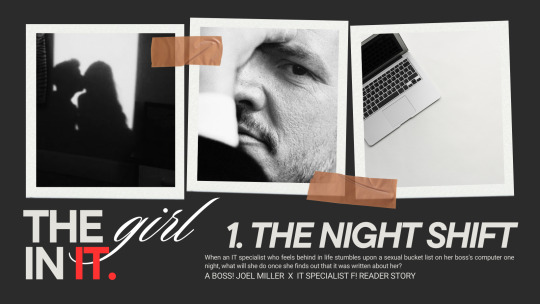
Chapter Rating: E (18+, MDNI)
Chapter Preview: "Well, it was a virus, and as I looked into the problem, I had to explore every avenue to ensure I pinpointed the issue, you know, for my report to Tess. I went into your history to see if it might have been a site that caused you to have the virus. I may have casually peeked into a few files to ensure they weren’t corrupted…” you admit, “…and I might have stumbled upon-" your eyebrows raise in embarrassment, "Something personal."
“Something personal?” He questions, his brows furrowed in confusion. “I don’t have anything personal… oh, shit.” His eyes widen as the realization dawns on him, hands covering his face as he groans in embarrassment. "Look, about my internet history... and the list-"
You slowly nod and bite your lip, mostly to hide your own embarrassment. “… yeah. Um, it was quite... informative about your... sexual preferences.”
Chapter Warnings and Tags: No Outbreak! Joel Miller, Mentions of intended smut towards the reader, Boss x Employee Relationship, Virgin Reader, All of the yearning, Joel Miller is a silly flirt, A small-ish age gap, Joel is too forward for his own good, Tess is a boss (and should not be fucked with - or you get the horns).
Word Count: 5.6K
A/N: Well, hello there!
I honestly have no idea where this idea of a (somewhat crack) fic came from, but I had an idea and I ran with it! A lot of the character development came from my own anxieties of feeling behind in life, and if you feel that way too, I feel you! Don't worry, I promise it won't always feel like this. Time is just that- time, and it's never too late to follow your dreams! I believe in you!

Subject: I think I have a Virus?
12:50 AM (10 min ago)
Hey Sugar,
I know it's late, but my computer fritzed out an hour ago (a shit ton of pop-ups) and I have that presentation with The H Hotel tomorrow morning. Well, do you think you could do me a solid and help me... not have any more of those darn pop-ups? I called the number that popped up asking if I needed assistance with the virus and they asked for my credit card information but they haven't replied back.
Shit, was that a scam? Fuck. I should call Amex.
Anyway, do you think you can help me get out of this bind, Sugar? I'll be forever and eternally grateful. If you don't, well... I'm sure Tess will rip me a new one, and I would like to not have a Servopoulos-level meltdown at 9 in the morning. Not after last time. Sorry about having to be a part of that, Sugar. At least Maria was able to pay for your dry cleaning and get you a new shirt? You should have let me check your chest for burns, I sure as hell wouldn't want scalding hot coffee being thrown in my direction either. Shit. Not check your chest as in checking out your... breasts, just the burn site. Yeah. That's what I meant.
(Also, sorry for emailing you last minute. Shit. I'm desperate, baby.)
Thanks,
Joel Miller
Owner and CEO, Miller Construction Group
(512) 123-4567
Subject: RE: I think I have a Virus?
1 AM (0 seconds ago)
Good Evening Mr. Miller,
I got your request and will work on it shortly. I can't make any promises, but I will try to get you out of your "bind".
Don't worry about that thing with Tess. She was rightfully upset, and I just so happened to be caught in the line of fire. If it had to be one of us, I am glad it was me being pelted with boiling hot coffee, and not you in front of your clients. You didn't have to have Maria buy me a blouse from Neiman Marcus, nothing a little tide-to-go can't fix, right? Also, I knew what you meant about my chest, and I didn't think you wanted to look at my... breasts. Let's not refer to any of my body parts moving forward.
Also, I am not completely comfortable with the terms of endearment that you continuously call me, Sir. Please refer to me by my actual name, these emails are monitored by Tess and I would not like to be scalded with hot coffee again for a little misunderstanding.
Please let me know if you have any other pressing questions or concerns.
Goodnight!
IT Specialist 0926,
IT Department, Miller Construction Group
(512) 765-4321

"Ok Bubbles, let's see what mess Mr. Miller got himself into this time."
Settling by your coffee table, you access your remote portal and insert your portable SSD, initiating various programs to gain entry into your boss's laptop. Securing your hair in a messy top bun with a claw clip, you find yourself biting your bottom lip in concentration. Simultaneously, you switch on your TV, finding solace in the ambient noise that fills your dimly lit apartment—a space shared with Sir Bubbles, your British Shorthair companion since your college days. There's a marathon of Criminal Minds airing on TBS, Spencer Reid's adorable face on screen as he rattles off another theory for why the unsub was an abuse victim by his prostitute mother. You turn the volume down a bit, drowning out his voice.
It's near silent in the little shoebox you call home, the only decent place you were able to afford with your meager savings- after slaving away as a Geek Squad IT Specialist for the majority of your twenties at the Best Buy down the road from your parent's house. Despite graduating with your MIS at the University of Texas - Dallas, finding a decent job in your industry was brutal, and, honestly, quite embarrassing after receiving 30-plus rejection emails in a span of a year. Downtrodden and desperate for a job, you settled on working at Best Buy temporarily, but by the time you hit your mid-30s, it's been eight years working for barely minimum wage, and absolutely nothing to show for it.
"Do you remember those sweet Miller boys who fixed our roof ten years ago?" your mother asks during a Sunday dinner six months ago, sliding a boat of gravy your way as you absentmindedly drizzle it over your mashed potatoes. "I ran into the older one... Joeseph? James? He owns his own company now with his brother, quite the feat, right? They're working on that hotel down the road... anyway, Josh-"
"Joel," you correct her, nudging the over-steamed carrots around your plate. "I think his name was Joel, Mama."
"Yes, Joel," your mother dismissively waves her hands. "Well, I told him about how you were on the job hunt, you know, with your master's and all. Oh, remember when you used to have that silly little crush on him? He's grown to be quite the looker, you know? Anyway, he told me that they were looking for someone to replace their old IT person—apparently, they retired—"
"Mom," you groan, "get to the point."
"Well," she grins conspiratorially, "he wants you to apply, baby. He remembers you and your little crush, and he said he could never forget someone as cute as you. If you're as good as I claimed you were, well... the job's practically yours!"
Your fork slips from your grasp, the metallic clang against porcelain causing Bubbles to leap in surprise, hissing at you in irritation. "Wait, what?" you blurt out, your eyes wide with a mix of shock and confusion.
Your mother beams at your reaction, seemingly pleased with the bombshell she just dropped. "I told him all about your IT skills and how you practically run the technology world from your bedroom. He seemed really interested, sweetie. And, well, it wouldn't hurt to at least consider it, right?"
You sit there, a swirl of thoughts and emotions whirling in your mind. The unexpected twist of Joel Miller, the older Miller boy you once had a crush on, remembering you and possibly offering you a job—it's surreal. Bubbles, having recovered from the earlier disturbance, casually resumes licking his paw, completely uninterested in the familial drama.
"I... I don't know, Mom," you stammer, trying to process this unexpected turn of events. "I mean, working for the Millers? It's a bit... complicated."
She leans in, her voice lowering to a conspiratorial whisper. "Sweetheart, this could be a fantastic opportunity. And who knows, maybe that little crush of yours could turn into something more... professional, of course." She cuts into her meatloaf, humming in contentment as she chews. "Oh, and Sweetie? Wear the red sweater with your pleated skirt, with something other than those sneakers. You're turning thirty-six in September; you can at least do yourself a favor and start dressing your age for once! I'm sure Joel would appreciate it!" she winks at you as your father grunts in displeasure, rolling his eyes, muttering "meddler" under his breath.
"Mom, it was just a crush from a decade ago. Besides, mixing work and personal feelings is never a good idea."
She chuckles, reaching across the table to pat your hand. "Well, think about it, okay? Joel seemed genuinely interested in having you on the team. It's worth exploring, don't you think?"
A wink, a handshake, and six months later, you find yourself on-call indefinitely, catering to Mr. Miller's every technological whim and folly. It's not a bad job, you reason — getting paid triple what you made at Best Buy, monitoring everyone's browsing history in the office, and fielding the incessant IT requests Mr. Miller sends your way- which was often. Way too often.
[My laptop won't turn on.] Did you charge it? Try doing that first.
[Why does the volume not work on my Zoom calls?] Did you make sure that you're not on mute or that your computer volume is up? Check that first.
[Since when did we put a parental blocker on the internet?] It was per Tess, who said that employees should be working instead of looking up anti-feminist manifestos on Reddit. I apologize for the inconvenience, Mr. Miller. [Oh, well shit. Do you think you could unblock it for me? I am... having a hard time accessing my... bank account.] I mean- I could, but I would have to run it by Tess first. [Do you think you could... for me? It'll be our little secret, Sugar. Don't worry about Tess, I'll handle her.] Sure, Mr. Miller... Right. Our little secret. [Sugar, for the last time, it's Joel. Besides, I thought we were past having a silly little crush on me, you've grown into a... rather nice young woman. Please, call me Joel.] Uh, sure Mr. Miller.
You are broken from your silent reverie by the unmistakable ding, ding, ding of the pop-ups Joel- Mr. Miller - you correct yourself, mentioned in his email. You scoff, biting into a piece of beef jerky. Typing in a command, the pop-ups halt, the black screen granting you developer access popping up as you run diagnostic after diagnostic trying to catch the little sucker - a virus, as Mr. Miller claimed - in the act of corrupting your poor boss' laptop once again. There you are, you little shit, you mutter under your breath as you furiously type in more commands, eradicating Mr. Miller's bane of existence for good (or so you hope).
After running what felt like the tenth diagnostic of the night and downing three cups of coffee for the last three hours, the dawn of a new day streaks through the sheer curtains against your window. With bated breath, you restart Joel's system once more, closing your eyes until the familiar chime of Windows 11 booting up reaches your ears.
Please, please, please for fucks sake... no more pop-ups...
Joel's home screen pops up in an instant, the photo of him and his two girls smiling back at you as you breathe in a sigh of relief. "Fuck yes! Finally!" you silently exclaim, a drawn-out yawn and a deep stretch escaping your body as you settle your laptop on your couch. "Okay, let's just run a few programs and check a few documents to make sure they're not corrupted and then I can finally hit the sack..." you squint at the digital clock of your microwave, "and sleep for an hour before I have to get ready for work," you groan, eyeing the jar of Cafe Bustelo in the distance. Yep. No sleep for me, you think bitterly. Another night, another one of Mr. Miller's computer meltdowns...
Your eyes scan his desktop, opening up the PowerPoint file he needs for his presentation. It opens up with a slight lag, something you can optimize later but you breathe out another sigh of relief anyway. You check his internet browsing history, his late-night extensive porn viewing not a surprise to you anymore as you snort at the ridiculousness of it all. At least it's not as bad and kinky as Tommy's browsing history, you tell yourself, because you'll never quite get used to all of the roleplay porn he watches religiously, you think. Closing out of Google Chrome, You scan his desktop for a random Word doc for you to open, not checking its title as you double-click on the first one that you see, slightly hidden by the Recycle Bin icon to the bottom right. Wants? What kind of a file name is that?
The Word doc pops open, and it seems to be a running list of random things. You blearily scan the line items, your eyes widening in shock as you read on.
Fuck her against my office door as I cover her mouth to muffle her screams.
Spoil her with a shopping spree at Neiman's with my Amex black card.
Fulfill my breeding fantasy by convincing her to get off of her Birth Control (do you think she's on one?)
Fuck her from behind against Tess' desk (serves her right)
You quickly exit out of the document, pushing your laptop away as if it were cursed. You look at the document title once more.
Wants.
What the fuck was this? Who is he talking about? you ponder, the guilt of your negligence weighing on you like a weight tied to your ankles as you sink into the depths of the Atlantic. You shut your laptop for good measure, covering it up with your quilt as you shake your head in disbelief.
What the fuck did I just read?

“Mr. Miller? Do you have a moment?”
You knock on the office door once more for good measure, standing timidly as you try to occupy yourself by smoothing out your dress - sensible, a decent length, work appropriate, you think to yourself. You try to not occupy the idle time of waiting for your boss, Joel Miller, one half of Miller Construction- and the thing you found while remote logging onto his computer last night - I think I have a virus, his email stated - only to stumble upon something rather telling and personal - but he was your boss, and you were a professional, and you weren’t going to think about the list…
Kiss her in the rain.
Make love in my truck as she rides me.
Bend her over my desk and take her from behind.
Marathon sex
Eat her out as she works at her desk.
No, Joel was unequivocally your boss—older than you by at least a decade (and maybe a few more years, give or take), and the document titled "Wants" was clearly personal, likely intended for someone else, and certainly not meant to be seen by anyone, especially not an overly curious IT specialist like you. No, you reckon that this list was meant for someone else in the office - someone beautiful, sexy, and confident— someone decidedly who isn't you. Certainly not for someone who dresses like she’s still in college, who only recently began living on her own in a shoebox of an apartment (if you can call it that) after living with her parents for the majority of her adult life, and who barely has her life together. It’s pathetic, being a woman of a certain age and with nothing to show for it, still painfully single, nothing substantial to your name, only getting your life together now while everyone around you has done everything right. I feel so behind in life, you think to yourself. Who would want someone so pathetic as me?
It’s not like it’s a crime to have wants, you think to yourself. Everyone has them, including you, you reason. So what if you just so happen to stumble upon your boss's deepest (and somewhat depraved) desires? Doesn’t everyone have a bucket list of their desires written somewhere? So what if your older, attractive boss with his Gen X tendencies has it typed out on his work computer? It’s not like he meant for you to open up the Word doc, right?
You knew he was single. You also knew that he had kids, at least two—Sarah, his eldest, was the head of HR, and Ellie, his adoptive younger daughter, an apprentice working under Tommy, the other half of Miller Construction—a serial flirt who asked you about your dating life in your interview a few months back. No, you didn’t think about your boss and the sheer mass of man that he was, that he smelled like cedar and sandalwood, that he winks when he tells you good morning as you pass him in the parking lot while stumbling out of your less-than-impressive shitty Corolla. You also didn’t take note that he drinks his coffee black with a sprinkle of sugar—the one in the brown packet—or that he eats in his office instead of the employee lounge because he’s a messy eater. The deep red blush trailing down his neck as Tommy scolded him about his lack of table manners during a company-mandated team-building day wasn't proof enough of that.
There wasn’t a ring on that tell-tale finger, not even a tan line, no photographs of another woman on his desk—besides his daughters, of course. Not that you were looking. Tommy had his wife Maria come down to the office often enough; wouldn’t Joel be the same with his own?
Miller Construction prided itself on being a family-run company, with Joel and Tommy at the helm and their best friend Tess as VP—more the boss than the actual Miller brothers. While Joel and Tommy preferred the hands-on work on-site, Tess ruled over the office with an iron fist. No one dared to cross her.
"You've got one job, and one job only," she declared during your office tour. "Make sure no one spends the majority of their shift watching porn, and keep Joel from messing up his computer with his boomer-isms. We can't afford to keep replacing a laptop every six months."
"Isn't he in Gen X?" you ask. "... at 56 years old, he's still considered to be in that generation, right?"
"Technically, yes," Tess replies with an exasperated sigh. "But you know what I mean. Sometimes it feels like Joel is stuck in a time warp with his 'boomer-isms.' Just keep things running smoothly here, alright?"
As the days pass, you notice an unusual trend in Joel's computer issues. It seems that every time his laptop malfunctions, it coincides with a spike in suspicious internet activity. It doesn't take a genius to connect the dots, and you can't help but shake your head at the irony of it all.
After a particularly eventful morning filled with more than the usual technical hiccups, you decide it's time to address the elephant in the room. You knock on Joel's office door, half-expecting him to be engrossed in some spreadsheet or construction plans.
It's not like you have to tell him about your snooping - he would be none the wiser judging by the way he was so technologically inept - you weren't about to tell him that the reason for the virus on the computer was because he was looking at some rather specific porn - boss fucks unsuspecting secretary from behind- his internet history had listed, nor did he probably think that his computer is being monitored, including his internet browsing history- company policy, as stated on the employee handbook that every employee of Miller Construction signs on the day of their official hiring- nor does he think that it sends reports to her at the end of the day.
You don't think about how the sudden uptick of his secretary porn viewing increased since a week after your hiring. It's just a coincidence, right?
“Mr. Miller?” You call out once more. “It’s about your IT request last night? I have an update?”
“Yeah? Sorry! Come on in!” you hear from behind the door, accompanied by the frantic shuffle of papers and a silent curse. You take a deep breath as your hand turns the doorknob. Silently, you shut the door behind you, offering a small smile as you smooth out the skirt of your dress once more.
You fidget in place in front of the door as Joel—Mr. Miller—in his green flannel and dark jeans slung just right—it really should be criminal, looking this ruggedly handsome for someone his age, you think—as he ungraciously flops onto his desk chair, motioning for you to take the seat in front of him as he clears his throat nervously. “Take a seat.”
You situate yourself in front of him, refusing to meet his eyes as you fiddle with your hands on your lap, wondering why he, out of all people, would be nervous. It's not like he stumbled upon something so... intimate. You are a professional, and you were only doing your job, you tell yourself like a mantra, trying to ground yourself. What's the worst that could happen? It's not like he would fire you over your accidental snooping, right? You nod to yourself. “So…”
“So…” he replies, Adam’s apple bobbing as he takes a drink of his coffee. “Thank you for taking a look at my computer last night.” He begins, smiling at you. “I know that it was late, and I’m willing to compensate your time by giving you time and a half…”
“Oh,” you nervously reply, shifting in your seat. “No, Mr. Miller—”
“Joel.”
“What?”
He shakes his head. “Please. We’re all family here. Call me Joel. Mr. Miller is my father for fuck's sake—”
“Right,” you chuckle. “Sure. Joel. Listen, you don’t need to compensate me for last night, let alone give me the overtime rate—”
“I emailed you at midnight; surely you were already busy, or I probably irritated your husband—”
“No.”
“No?”
“No,” you mumble solemnly, “there’s no husband, just me and my cat-“
He barks at that, the laugh so loud it makes you jump in your seat. He gives you a look, almost as if he was relieved with that bit of information. “Well, disturbing your cat, then-“
"Oh," you reply casually, waving your hands in dismissal. "I'm sure Sir Bubbles didn't mind... and I don't sleep much, really—"
"Oh?" He straightens himself, his face serious. "Is it because of all of my requests? Shit. My girls give me such a hard time about not being with the times, I'm not really interested in technology— So no husband? Boyfriend, then?"
"Uh, no," you reply quickly, not eager to delve into the details of your lackluster love life. You clear your throat, adopting a professional demeanor. "Joel, as you're aware—or maybe not," you chuckle nervously, "I receive reports of all employee internet histories at the end of the day. Being the sole IT specialist on your payroll—perks of the job, outlined in my duties—I keep an eye out for any... irregularities."
"Irregularities?" he replies, his demeanor shifting into something resembling guilt. "What are you trying to get at?" he presses.
"Well, I monitor employee computer usage to make sure that they're not... distracted from their work," you reply. "Tess was explicit about not having any employees using company time for any unnecessary personal... dalliances."
Joel gives you a hard look. "Dalliances?"
"Yes, dalliances. Tess told me it was an issue before, with employees browsing social media and visiting questionable Reddit threads?"
"I don't follow," Joel replies. "You gotta spell it out for me, Sugar. What does that have to do with my request last night? I had a late night at the office, and after... checking my emails," he gulps, "I suddenly get bombarded with these pop-up things, so much that I just... unplugged my laptop... and, well-"
How is he so oblivious about this? You bite your cheek in frustration, not knowing how to get to the point without having to spell it out for him that you caught him browsing porn last night, secretary porn at that, and although it's highly inappropriate, you hardly think he was watching it because of Gladys, his actual secretary, who is old enough to be his mother. Not unless he has some weird mommy kink...
Unable to endure the suspense any longer, you decide to rip the bandaid off as soon as possible. “I’m sorry!” You exclaim, “I didn't mean to look at your browsing history, I mean, I had to, but only because I had to find the reason why a virus got on your computer, but that is not the point! I had to open a file to make sure it wasn't corrupted, and I swear, I didn't mean to open it!"
“Open what, sweetheart?” he smiles at you, leaning forward towards you.
"Well, it was a virus, and as I looked into the problem, I had to explore every avenue to ensure I pinpointed the issue, you know, for my report to Tess. I went into your history to see if it might have been a site that caused you to have the virus. I may have casually peeked into a few files to ensure they weren’t corrupted…” you admit, “…and I might have stumbled upon-" your eyebrows raise in embarrassment, "Something personal."
“Something personal?” He questions, his brows furrowed in confusion. “I don’t have anything personal… oh, shit.” His eyes widen as the realization dawns on him, hands covering his face as he groans in embarrassment. "Look, about my internet history... and the list-"
You slowly nod and bite your lip, mostly to hide your own embarrassment. “… yeah. Um, it was quite... informative about your... sexual preferences.”
Joel visibly pales at your confession. He adjusts his collar, unbuttoning the second button as if he were being strangled by your scrutiny. “I just want to let you know", he starts, looking you in the eye with an unreadable expression. "I respect you as a woman, and Tommy, fuck, he wouldn’t let it go, with all that teasing about you being exactly my type and all, and well, your mother did remind me about your little crush on me back then-“ he rubs his hands through his hair as he rambles on, “… and I know that this looks bad, with you being my employee and all-“
“Wait, what?” You cut him off, a confused look on your face. “What do you mean? I mean, they're your personal preferences, and the list, well, I'm sure whoever you're writing about must be some woman, not that it's any of my business-”
“Fuck. You didn’t read all of it?”
“No!” You exclaim, practically jumping out of your seat. “I quickly closed it once I realized the nature of the document…”
“Well.” He stands up suddenly, pacing behind his desk. “I wrote that drunkenly one night after the company dinner, you know, the one when you wore that dress… do you remember?”
“Yes,” you reply breathily, “… the night where-“
You vividly recall that night. It was a dinner at the recently completed new hotel project. After a few glasses of wine and an impulsive, rather expensive purchase at Nordstrom.com a week prior, you endured most of the evening in an uncomfortably tight and overly revealing dress—a poor choice for a company party, for fucks sake. You believed Joel approached you at the end of the night out of sheer pity, not because—
“Well… after seeing you in that dress, and how stunning you looked in it, sitting by yourself, biting your lip in a way that makes me-“ he stops himself, giving you a small smile. “I was drunk, and I was thinking… I was contemplating how, if I were to have you, if you, by some miracle of fate… were interested, that I would do things right, you know? That if I had a second chance at… I would do it right. Treat you right.”
“You do know I’m not a secretary, let alone your secretary,” you roll your eyes. “I’m in IT… the only person in IT actually, and you’re not the first person I caught looking at questionable porn…”
Joel bristles at that. “Shit. Let me guess… Tommy?”
That gets a small smile out of you. “I can neither confirm nor deny, but… he’s partial towards a certain porn actress, and let’s just say he is really in love with women who looks like his wife.”
He smiles. "Shit, I thought I was being obvious enough, being that Tommy has teased me about it enough... I thought you knew. I know you work with computers, Sugar. I’m not completely senile, and I know Tess has been on a warpath about people getting their rocks off at work, I figured you would look at all of my… perusing.”
You're left stunned, your mind racing to process what Joel just revealed. It's not the revelation about his desires that leaves you speechless, but the unexpected admission of his feelings toward you. Your mind flashes back to the list, the desires that seemed so out of reach for someone like you. You never thought Joel would be harboring any feelings for you, let alone express them so openly.
"I... I had no idea," you stammer, still grappling with the revelation. "I thought that list was for someone else, someone... not me."
Joel walks around the desk, his eyes never leaving yours. "You thought wrong, sweetheart. I've been trying to drop hints, but I guess I've been subtler than I thought."
A myriad of emotions wash over you — confusion, surprise, and a hint of something you can't quite place. The professional boundary between boss and employee seems to blur, and you find yourself in uncharted territory.
"But," he continues, "I get it. I'm your boss, and this is complicated. I didn't want to put you in an awkward position. I should've been more direct."
You take a deep breath, trying to steady yourself. "Joel, it's not about being direct or indirect. This is just... unexpected. I never thought someone like you would... feel that way about someone like me."
He reaches out, gently lifting your chin so you meet his gaze. "Someone like me? What does that even mean, darlin'? You're intelligent and beautiful, and I've seen the way you handle your work. I've noticed you, and I can't help how I feel."
A mixture of vulnerability and sincerity in his eyes makes it hard to doubt his words. You start to consider the possibility that maybe, just maybe, your insecurities have clouded your perception.
"I don't want to pressure you, and I understand if you're not comfortable with this. I just needed you to know. The last thing I want is for things to be awkward at work," he says, his thumb gently caressing your cheek.
You take a moment to absorb everything. Joel's revelation, your preconceptions, and the unexpected turn of events. The office, once a familiar space, now feels like uncharted territory.
"I need time to process this," you finally say. "It's a lot to take in, Joel. I never expected... any of this."
He nods understandingly, his hand dropping to his side. "Take all the time you need. I'll respect whatever decision you make. And hey, if you're not interested, we can go back to being boss and employee, like nothing happened."
You manage a small smile, appreciating his attempt to lighten the mood. "I'll... let you know. Just give me some time, okay?"
"Of course," he says, moving back toward his desk. "And, for what it's worth, I meant every word on that list. Whether it's a rain kiss or making love in my truck, I want it all with you."
You nod, silently acknowledging his sincerity. As you leave his office, you can't help but wonder how a routine IT request led to such a revelation. The office dynamics have shifted, and you find yourself navigating uncharted waters, unsure of where this unexpected revelation will lead.
As you walk away from Joel's office, a whirlwind of conflicting thoughts consumes your mind. The revelation about Joel's feelings for you is a shock, but it's not the only thing echoing in your head. The list of desires he had penned down only magnifies your own insecurities. The voice in your mind grows louder, whispering that you're not the woman he deserves—too much of a mess, too behind in life, and certainly not beautiful enough for someone like him. The echoes of your perceived inadequacies replay like a broken record, drowning out the possibility that someone could genuinely see something valuable in you. You glance at your reflection in the office window, critiquing every imperfection, every perceived flaw. The dress that seemed sensible before now feels like a sad attempt to disguise what you believe is a lack of style or grace. The weight of self-doubt becomes an invisible burden, and you can't shake the feeling that you're not enough, that you may never be enough for someone like Joel.
As you grapple with your internal struggles, a small spark of defiance begins to flicker within you. Perhaps it's time to challenge those self-limiting beliefs, to be bolder than your insecurities allow. Joel's admission has opened a door you never expected, and you find yourself at a crossroads. Despite the echoes of doubt, a newfound courage whispers that maybe, just maybe, you can be more than what you perceive.
Embracing this sudden surge of determination, you make a decision. Instead of letting fear dictate your actions, you choose to confront the uncertainties head-on. Swallowing the apprehension that threatens to hold you back, you turn on your heel and head back to Joel's office. The faint thud of your own heartbeat echoes in your ears as you push open the door.
"Joel," you say, your voice steadier than you anticipated. "I've been thinking about what you said, and I need you to clarify something for me."
He looks up from his desk, curiosity etched across his features. "Sure, what's on your mind?"
You take a deep breath, suppressing the self-doubt that still lingers. "Is that list something you genuinely desire with me, or was it just a drunken fantasy?"
Joel's eyes lock onto yours, a mix of surprise and sincerity in his gaze. "Every word of it is something I want with you. Why?"
A daring smile plays on your lips as you respond, "Then let's not leave it as a list, Joel. Let's see how many of those desires we can turn into reality."
The room seems to hold its breath for a moment as Joel's expression shifts from surprise to a slow, understanding smile. The air thickens with anticipation, leaving the next steps uncertain but filled with the promise of something new and exhilarating. As you stand on the precipice of this unexpected journey, the uncharted waters of possibilities lie ahead, and you find yourself ready to take the plunge.

Taglist: @gwendibleywrites, @joeldjarin, @brittmb115
For more updates on all of my fics, please follow @chiriwritesstuffnotifs
All dividers by @saradika-graphics
#pedro pascal#joel miller fanfiction#joel miller x you#joel miller#joel miller x reader#pedro pascal fanfiction#joel miller x female reader#joel the last of us#joel tlou#joel miller fanfic#joel miller smut#tlou hbo#tlou fic#tlou fanfiction#the last of us fic#the last of us#tlou#the last of us hbo#the last of us fanfic
693 notes
·
View notes
Text

So I got this tag on my answer to an ask about when it became acceptable for western women to wear pants, and you know it's all I need to go on a tangent.
I think the short answer here would be men have worn skirts as long as people have worn anything, so pretty long tbh. But since I am incapable of answering anything shortly, I think we can re-frame this question:
When did skirts stop being socially acceptable for men?
So let's start with acknowledging that tunics, togas, kirtles and such men wore through history were, in fact, skirts. I think there's often a tendency to think of these as very different garments from those that women wore, but really they are not. Most of the time they were literally referred to with the same name. (I will do a very broad and simplified overview of men's clothing from ancient times to Early Middle Ages so we can get to the point which is Late Middle Ages.)
Ancient Greek men and women both wore chitons. Even it's length wasn't determined by gender, but by occupation. Athletes, soldiers and slaves wore knee-length chitons for easier movement. Roman men and women wore very similar garment, tunics. Especially in earlier ancient Rome long sleeves were associated with women, but later became more popular and unconventional for men too. Length though was still dependent on occupation and class, not gender. Toga was sure men's clothing, but worn over tunic. It was wrapped around the waist, like a dress would, and then hung over shoulder. Romans did wear leggings when they needed to. For example for leg protection when hunting as in this mosaic from 4th century. They would have been mostly used by men since men would be doing the kinds of activities that would require them. But that does not lessen the dressyness of the tunics worn here. If a woman today wears leggings under her skirt, the skirt doesn't suddenly become not a skirt.
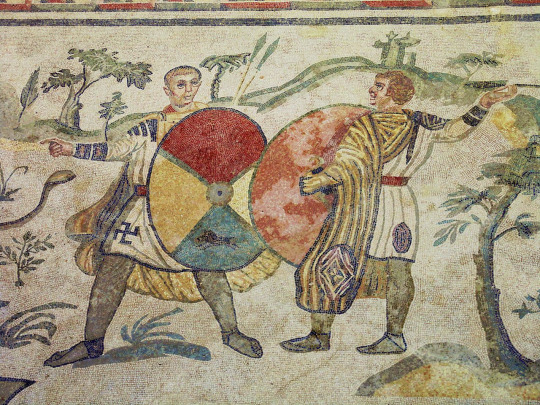
All over Europe thorough the early Middle Ages, the clothes were very similar in their basic shape and construction as in Rome and Greece. In Central and Northern Europe though people would wear pants under shorter tunics. There were exceptions to the everyone wearing a tunic trend. Celtic men wore braccae, which were pants, and short tunics and literally just shirts. Celts are the rare case, where I think we can say that men didn't wear dresses. Most other peoples in these colder areas wore at least knee-length tunics. Shorter tunics and trousers were worn again mostly by soldiers and slaves, so rarely any other woman than slave women. The trousers were though definitely trousers in Early Middle Ages. They were usually loose for easier construction and therefore not that similar to Roman leggings. However leggings style fitted pants were still used, especially by nobility. I'd say the loose trousers are a gray area. They wore both dresses and pants, but still definitely dresses. I'd say this style was very comparable to the 2000s miniskirts over jeans style. First one below is a reconstruction of Old Norse clothing by Danish history museum. The second is some celebrity from 2005. I see no difference.
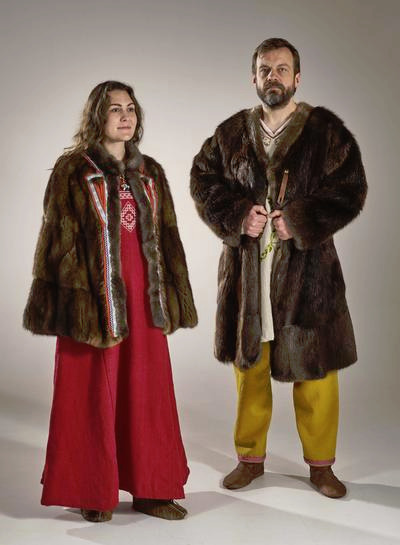
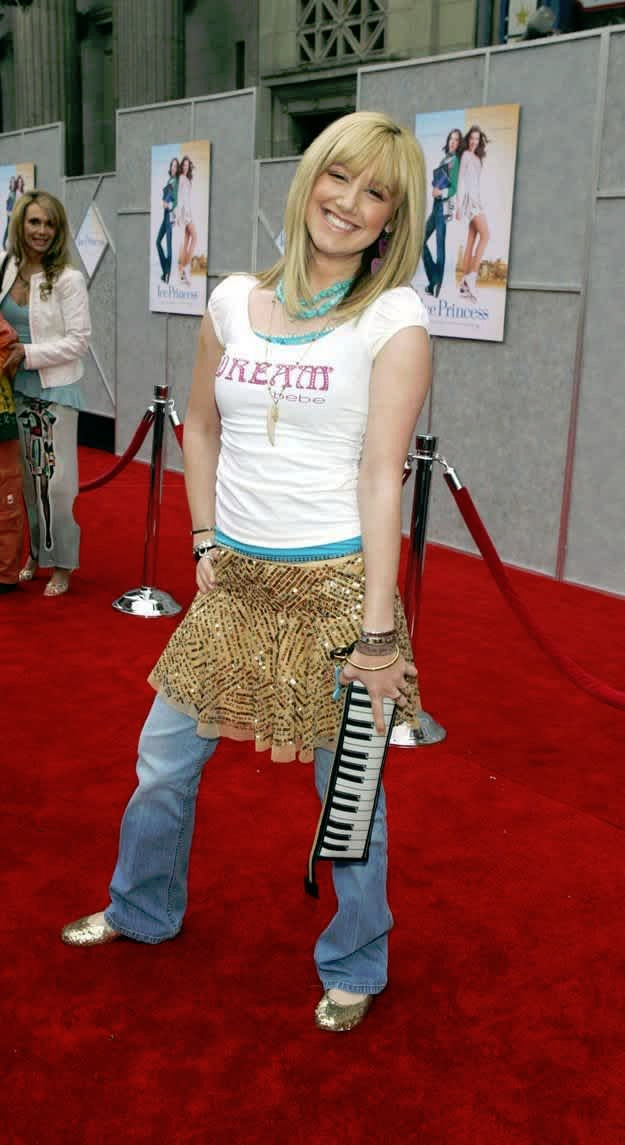
When we get to the high Middle Ages tunics are still used by both men and women, and still it's length is dependent on class and activity more than gender, but there's some new developments too. Pants and skirt combo is fully out and leggings' are back in in form of hose. Hose were not in fact pants and calling them leggings is also misleading. Really they are socks. Or at least that's how they started. As it has become a trend here they were used by everyone, not just men. During early Middle Ages they were worn often with the trousers, sometimes the trousers tucked inside them making them baggy. In high Middle Ages they became very long when used with shorter tunics, fully displacing the need for trousers. They would be tied to the waist to keep them up, as they were not knitted (knitting was being invented in Egypt around this time, and some knitting was introduced to Europe during middle Ages, but it really only took off much later during Renaissance Era) and therefore not stretchy. First picture is an example of that from 1440s. Another exciting development in the High Medieval era was bliaut in France and it's sphere of influence. Bliaut was an early attempt in Europe of a fitted dress. And again used by both men and women. The second illustration below from mid 12th century shows a noble man wearing a bliaut and nicely showing off his leg covered in fitted hose. Bliaut was usually likely fitted with lacing on the sides, but it wasn't tailored (tailoring wasn't really a thing just yet) and so created a wrinkled effect around the torso.
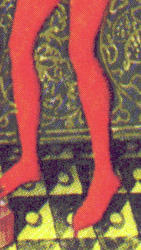

In the 14th century things really picked up in European fashion. European kingdoms finally started to become richer and the rich started to have some extra money to put into clothing, so new trends started to pop up rapidly. Tailoring became a thing and clothes could be now cut to be very fitted, which gave birth to fitted kirtle. At the same time having extra money meant being able to spend extra money on more fabric and to create very voluminous clothing, which gave birth to the houppelande.
Kirtle was once again worn by everyone. It wasn't an undergarment, for women that would be shift and men shirt and breeches, but it was an underlayer. It could be worn in public but often had at least another layer on top of it. The bodice part, including sleeves were very fitted with lacing or buttons (though there were over-layer kirtles that had different sleeves that changed with fashions and would be usually worn over a fitted kirtle). Men's kirtles were short, earlier in 14th century knee-length but towards the end of the century even shorter styles became fashionable in some areas. First picture below shows a man with knee-length kirtle from 1450s Italy.
Houppelande was also unisex. It was a loose full-length overgown with a lot of fabric that was gathered on the neckline and could be worn belted or unbelted. The sleeves were also wide and became increasingly wider (for men and women) later in the century and into the next century. Shorter gowns similar in style and construction to the houppelande were also fashionable for men. Both of these styles are seen in the second picture below from late 14th century.
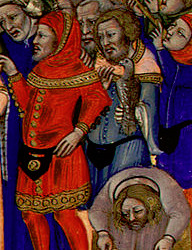
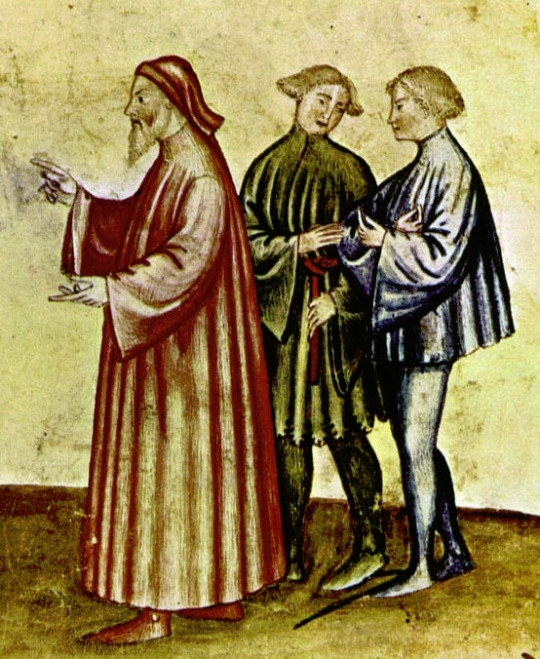
In the very end of 14th century, first signs of pantification of men can be seen. In France and it's sphere of influence the skirt part of the kirtle became so short it barely covered the breeches as seen below on these fashionable musicians from 1395-1400 France. Long houppelandes, length ranging from floor to calf, were still used by men though (the second picture, 1414 France), as were knee and thigh length gowns of similar loose style.
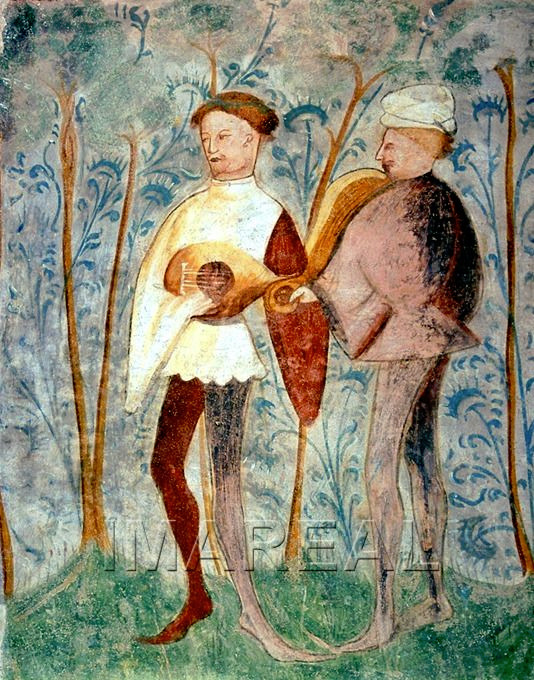
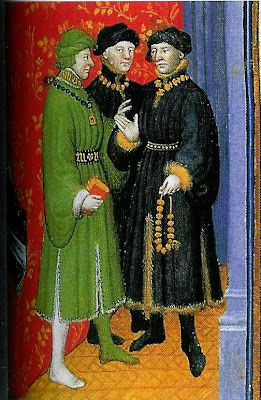
The hems continued to be short through the 15th century in France, but in other places like Italy and German sphere of influence, they were still fairly long, at least to mid thigh, through the first half of the century. In France at some point in late 13th century the very short under-kirtle started to be called doublet and they are just getting shorter in 1400s. The showing underwear problem was fixed by joined hose and the codpiece, signaling the entrance of The Sluttiest Era of men's fashion. Below is an example from 1450s Belgium of doublet and early codpiece in display. As you can see from the other figures, the overgowns of the previous century were also getting very, very short. In the next French example below from 1470s we can see the skirt shrink out of existence right before our eyes.
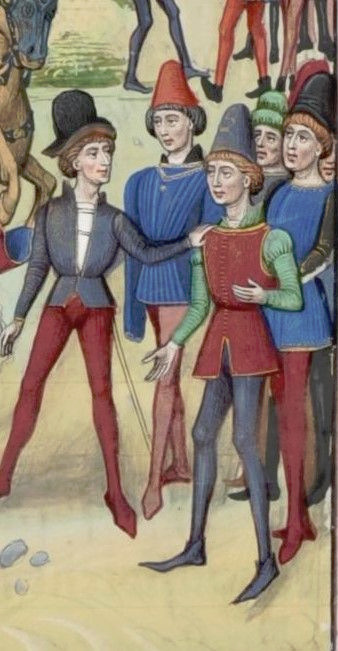
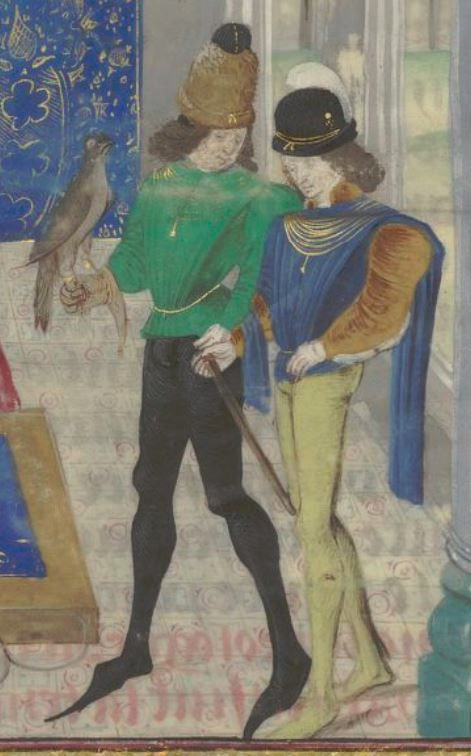
The very skimpy doublet and it's accompanying codpiece spread to the rest of the Europe in the second half of 15th century and it would only get sluttier from there. The Italians were just showing their full ass (example from 1490s). The dress was not gone yet though. The doublet and codpiece continued to be fashionable, but the overdress got longer again in the French area too. For example in the second example there's Italian soldiers in a knee length dresses from 1513.
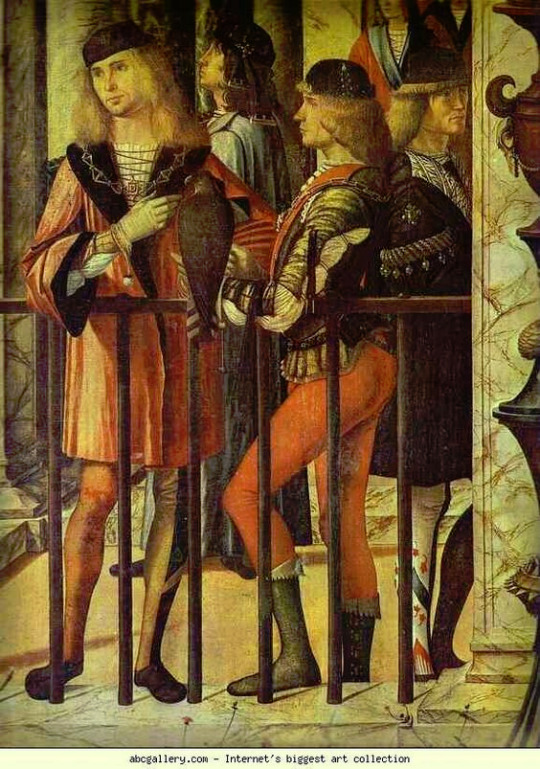
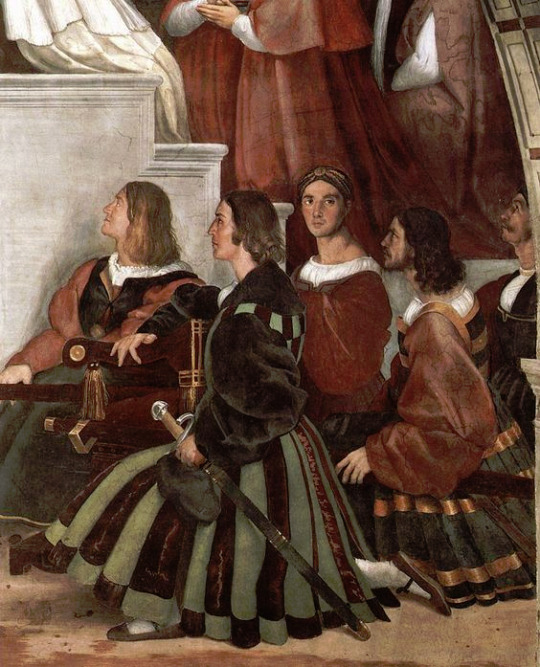
But we have to talk about the Germans. They went absolutely mad with the whole doublet and codpiece. Just look at this 1513 painting below (first one). But they did not only do it sluttier than everyone else, they also changed the course of men's fashion.
Let's take a detour talking about the Landsknecht, the mercenary pikeman army of the Holy Roman Empire. (I'm not that knowledgeable in war history so take my war history explanation with a grain of salt.) Pikemen had recently become a formidable counter-unit against cavalry, which earlier in the Medieval Era had been the most important units. Knights were the professional highly trained cavalry, which the whole feudal system leaned against. On the other hand land units were usually not made of professional soldiers. Landsknecht were formed in late 15th century as a professional army of pikemen. They were skilled and highly organized, and quickly became a decisive force in European wars. Their military significance gave them a lot of power in the Holy Roman Empire, some were even given knighthood, which previously wasn't possible for land units, and interestingly for us they were exempt from sumptuary laws. Sumptuary laws controlled who could wear what. As the bourgeois became richer in Europe in late Middle Ages and Renaissance Era, laws were enacted to limit certain fabrics, colors and styles from those outside nobility, to uphold the hierarchy between rich bourgeois and the nobles. The Landsknecht, who were well payed mercenaries (they would mutiny, if they didn't get payed enough), went immediately absolute mad with the power to bypass sumptuary laws. Crimes against fashion (affectionate) were committed. What do you do, when you have extra money and one of your privileges is to wear every color and fabric? You wear every color and fabric. At the same time. You wear them on top of each other and so they can be seen at the same time, you slash the outer layer. In the second image you can feast your eyes on the Landsknecht.

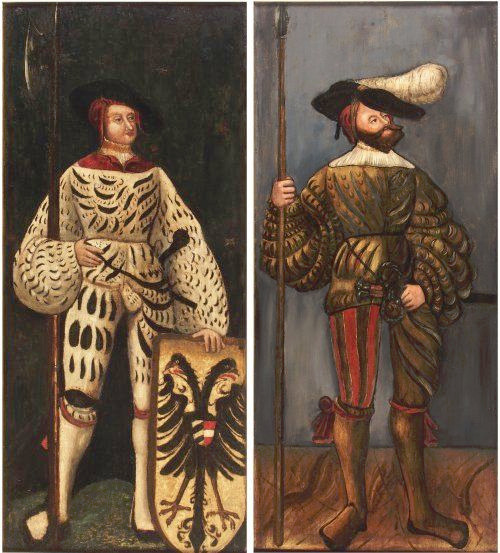
Just to give you a little more of that good stuff, here's a selection of some of my favorite Landsknecht illustrations. This is the peak male performance. Look at those codpieces. Look at those bare legs. The tiny shorts. And savor them.
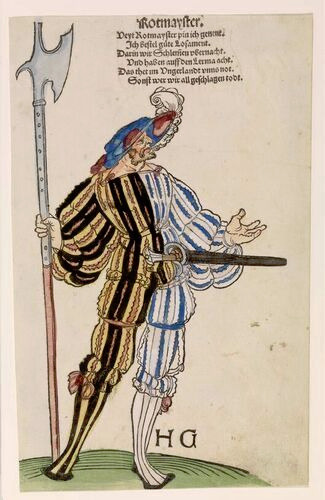
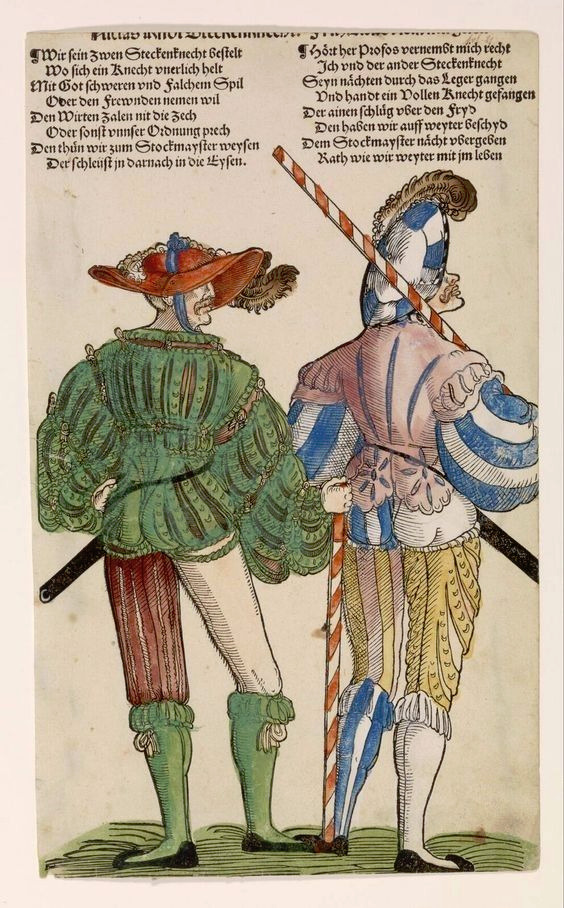
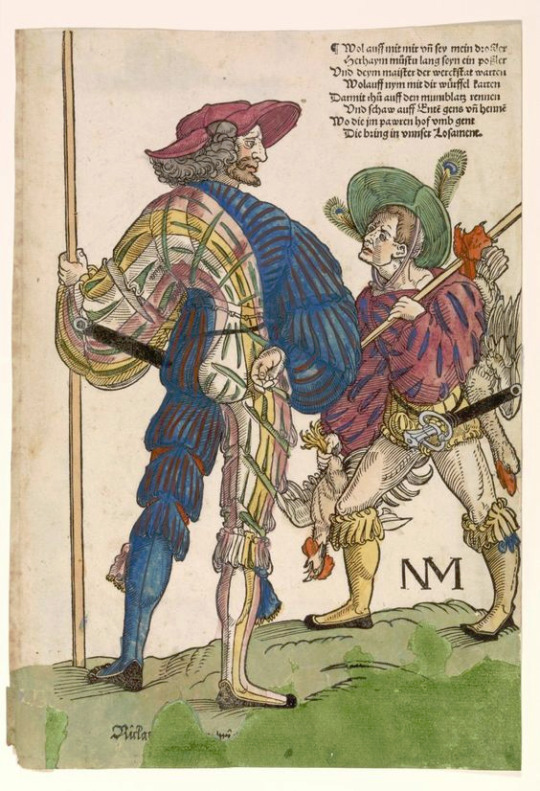
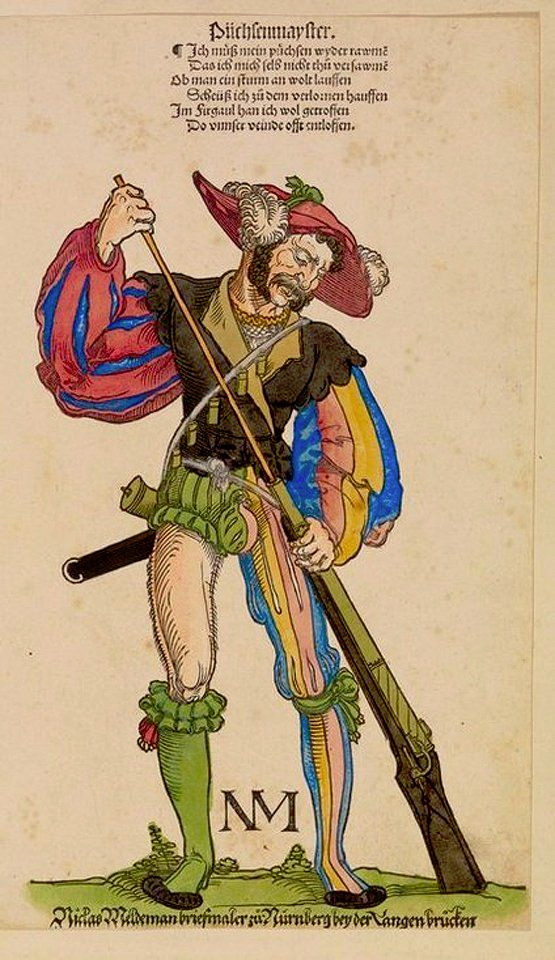
The Landsknecht were the hot shit. Their lavish and over the top influence quickly took over men's fashion in Germany in early 1500s. Slashing, the technique possibly started by them, but at least popularized by them, instantly spread all over Europe. That's how you get the typical Renaissance poof sleeves. They at first slashed the thighs of their hose, but it seems like to fit more of everything into their outfits, they started wearing the hose in two parts, upper hose and nether hose, which was a sort of return to the early Medieval trousers and knee-high hose style. The two part hose was adopted by the wider German men's fashion early in the century, but already in 1520s had spread to rest of Europe. It was first combined with the knee-length overdress that had made it's comeback in the turn of the century, like in this Italian painting from 1526 (first image). At this point knitting had become established and wide-spread craft in Europe and the stockings were born, replacing nether hose. They were basically nether hose, but from knitted fabric. The gown shortened again and turned into more of a jacket as the trunk hose became increasingly the centerpiece of the outfit, until in 1560s doublet - trunk hose combination emerged as the standard outerwear (as seen in the second example, 1569 Netherlands) putting the last nail on the coffin of the men's dress as well as the Sluttiest Era. The hose and doublet became profoundly un-slutty and un-horny, especially when the solemn Spanish influence spread all over with it's dark and muted colors.

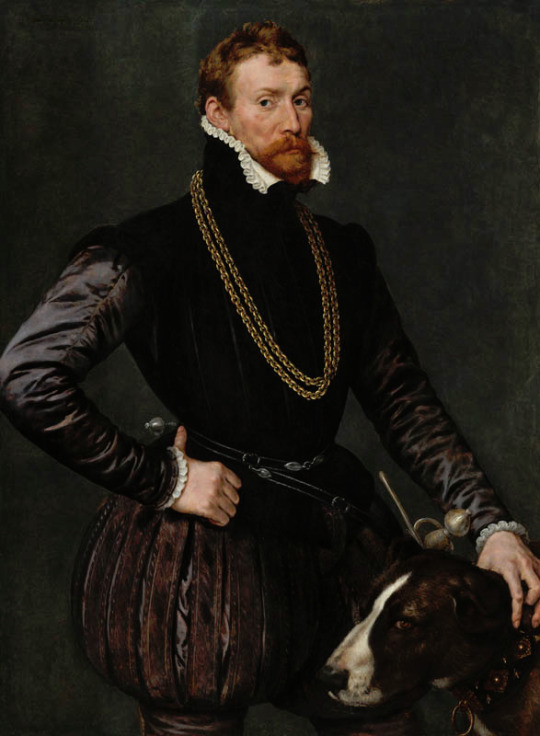
Especially in Middle Ages, but thorough European history, trousers have been associated with soldiers. The largely accepted theory is that trousers were invented for horse riding, but in climates with cold winters, where short skirts are too cold, and long skirts are still a hazard when moving around, trousers (with or without a short skirt) are convenient for all kinds of other movement requiring activities like war. So by adopting hose as general men's clothing, men in 1500s associated masculinity with militarism. It was not a coincidence that the style came from Landsknecht. I may have been joking about them being "peak male performance", but really they were the new masculine ideals for the new age. At the time capitalism was taking form and European great powers had begun the process of violently conquering the world for money, so it's not surprising that the men, who fought for money and became rich and powerful doing so, were idealised.
Because of capitalism and increasingly centralized power, the feudal system was crumbling and with it the feudal social hierarchy. Capitalism shifted the wealth from land ownership (which feudal nobility was built upon) to capital and trade, deteriorating the hierarchy based on land. At the same time Reformation and centralized secular powers were weakening the power of the Church, wavering also the hierarchy justified by godly ordain. The ruling class was not about to give up their power, so a new social hierarchy needed to form. Through colonialism the concept of race was created and the new hierarchy was drawn from racial, gender and wealth lines. It was a long process, but it started in 1500s, and the increasing distinction between men's and women's fashions was part of drawing those lines. At the same time distinctions between white men and racialized men, as well as white women and racialized women were drawn. As in Europe up until this point, all over the world (with some exceptions) skirts were used by everyone. So when European men fully adopted the trousers, and trousers, as well as their association to military, were equated with masculinity, part of it was to emasculate racialized men, to draw distinctions.
Surprise, it was colonialism all along! Honestly if there's a societal or cultural change after Middle Ages, a good guess for the reason behind it is always colonialism. It won't be right every time, but quite a lot of times. Trousers as a concept is of course not related to colonialism, but the idea that trousers equal masculinity and especially the idea that skirts equal femininity are. So I guess decolonize masculinity by wearing skirts?
#this has been sitting in my drafts almost finished for like a year or something#historical fashion#fashion history#fashion#history#dress history#men's historical fashion#renaissance fashion#medieval fashion#western fashion#western fashion history#landsknecht
3K notes
·
View notes
Text
Re: the Fagot anti-tank rocket, it reminds me of my favorite story of Soviet weapon design.
So, the Nazis were working in infrared homing missiles during WW2 but never completed any by the time the war ended (though they got close).
The Americans collected a lot of information on these systems, through spies and Operation Paperclip, and started work on their own guided air-to-air missile: the AIM-9 Sidewinder.
They worked on it from 1946 to 1955, when it was operationally complete and authorized for mass production.
The first time they got used was the Second Taiwan Strait Crisis, in 1958. The Taiwanese air force was flying American F-86 Sabres, vs China's MiG-17s. The MiG-17 outclassed the F-86s, flying over them so high the Sabres couldn't hope to hit them, and then they could swoop down and attack when they had the advantage.
So the US decided to help out: they secretly helped Taiwan modify their F-86s with the new heat seeking missile, and provided something like a dozen of the missiles to use again the MiG-17s.
On the 24th of September, the F-86s engaged the MiG-17s with the new missiles, surprising them with the ability to attack when the MiG-17s were supposedly outside the operational range of the F-86s, shooting some planes down. This was the first use of guided air to air missiles in combat.
Four days later, there was another skirmish, and an F-86 shot an AIM-9 Sidewinder into a MiG-17... And it didn't explode.
The MiG-17 made it back to base, with the groundbreaking new missile type never before seen in the history of warfare, and it was mostly intact. The Soviets convinced the Chinese to send them the missile, and within two years they had developed the Vympel K-13: a clone of the AIM-9 Sidewinder.
The US took the best of Nazi scientists weapon development, then spent over a decade developing a never before seen super-weapon that would change air combat forever... And one of the first DOZEN fired ended up embedded in plane, unexplored, and then delivered to their greatest enemy.
They might as well just have mailed the schematics to the Kremlin. And I think that's hilarious.
503 notes
·
View notes